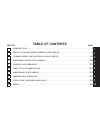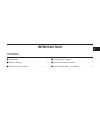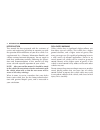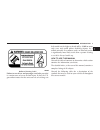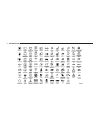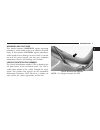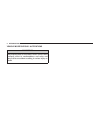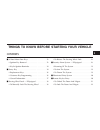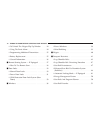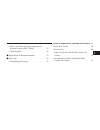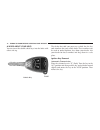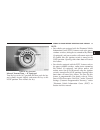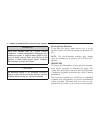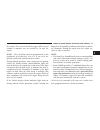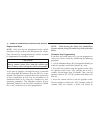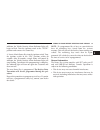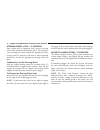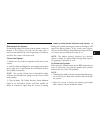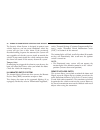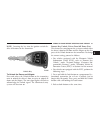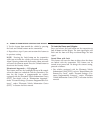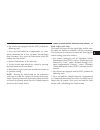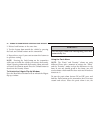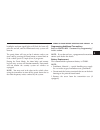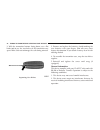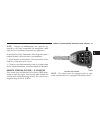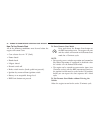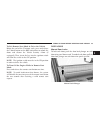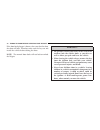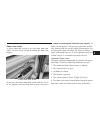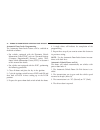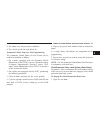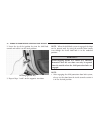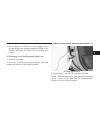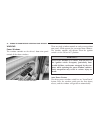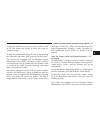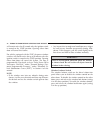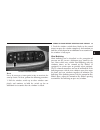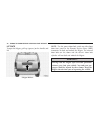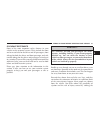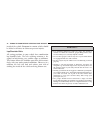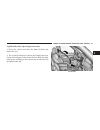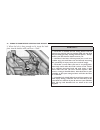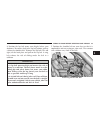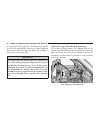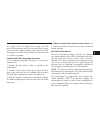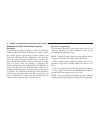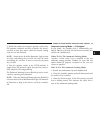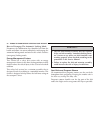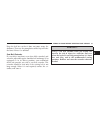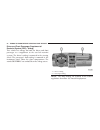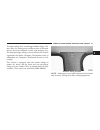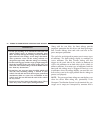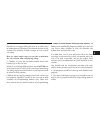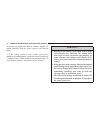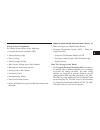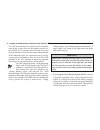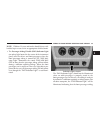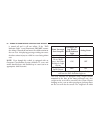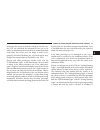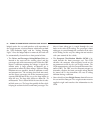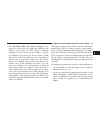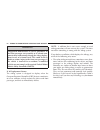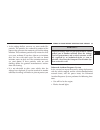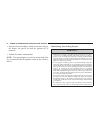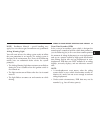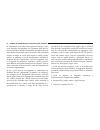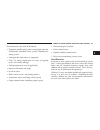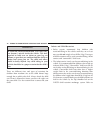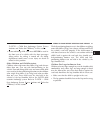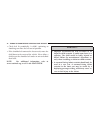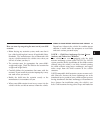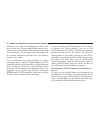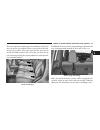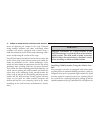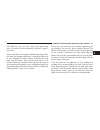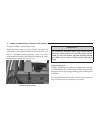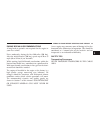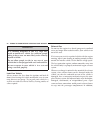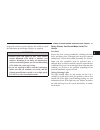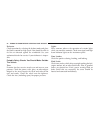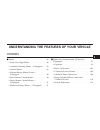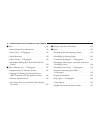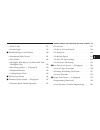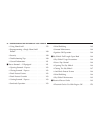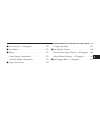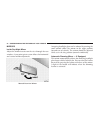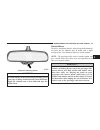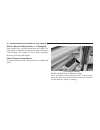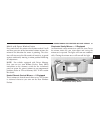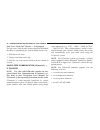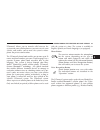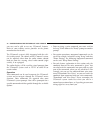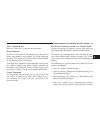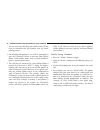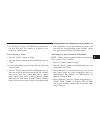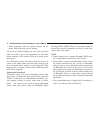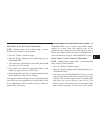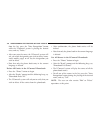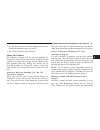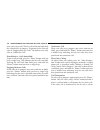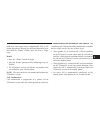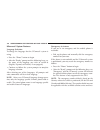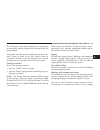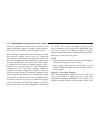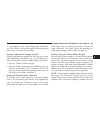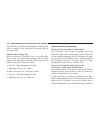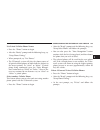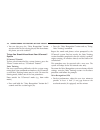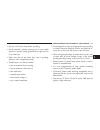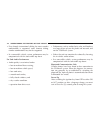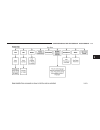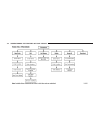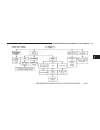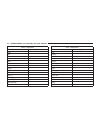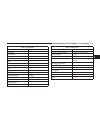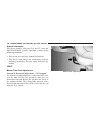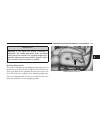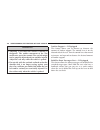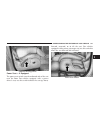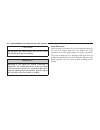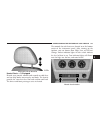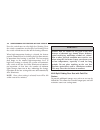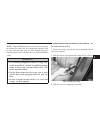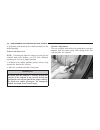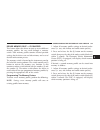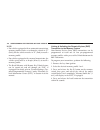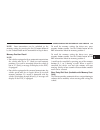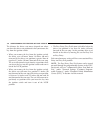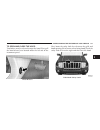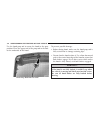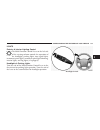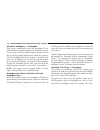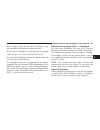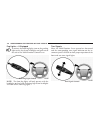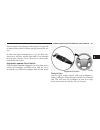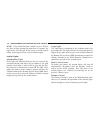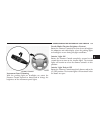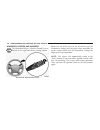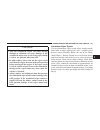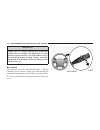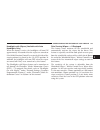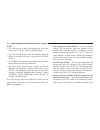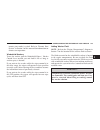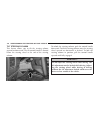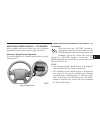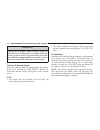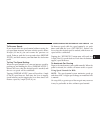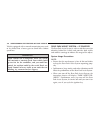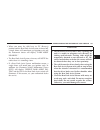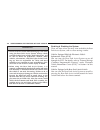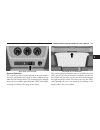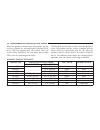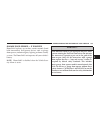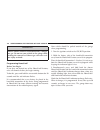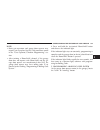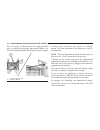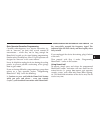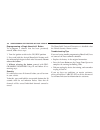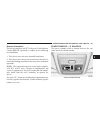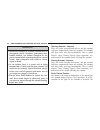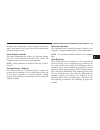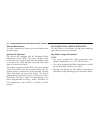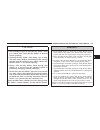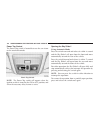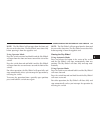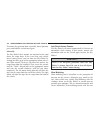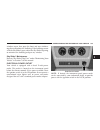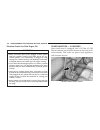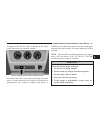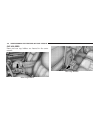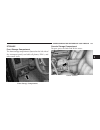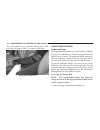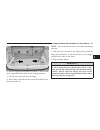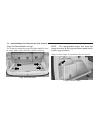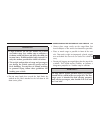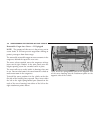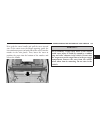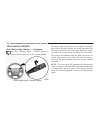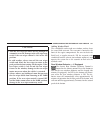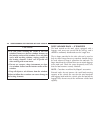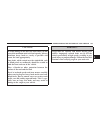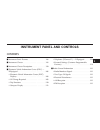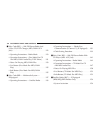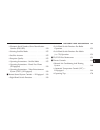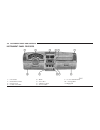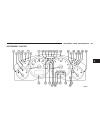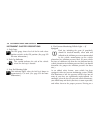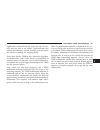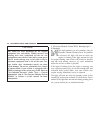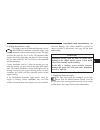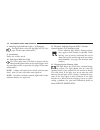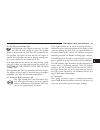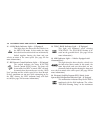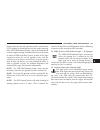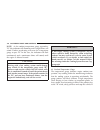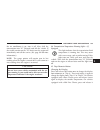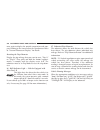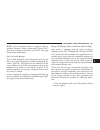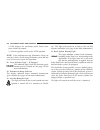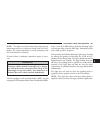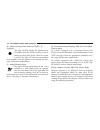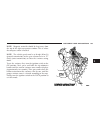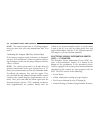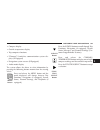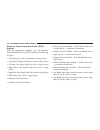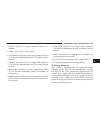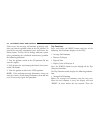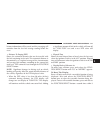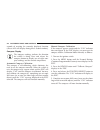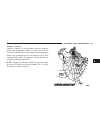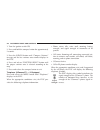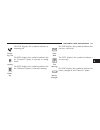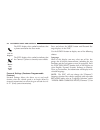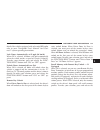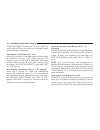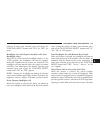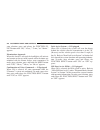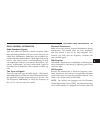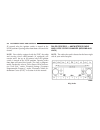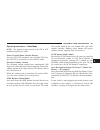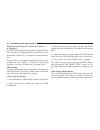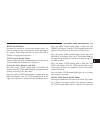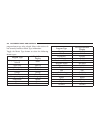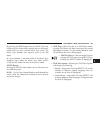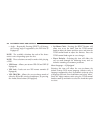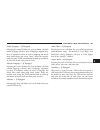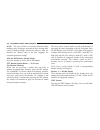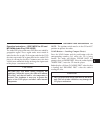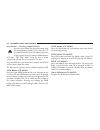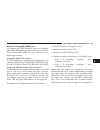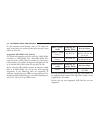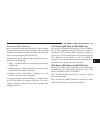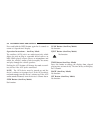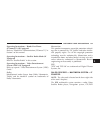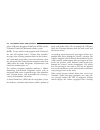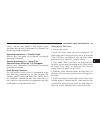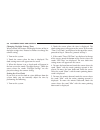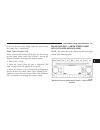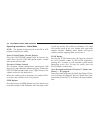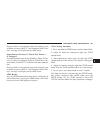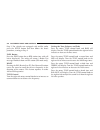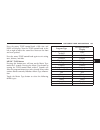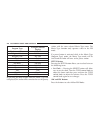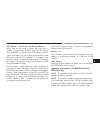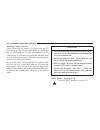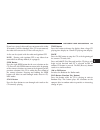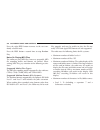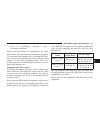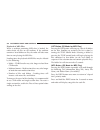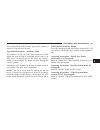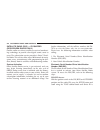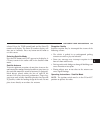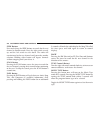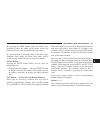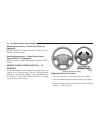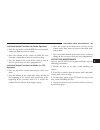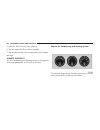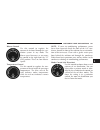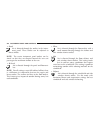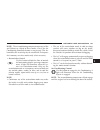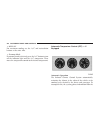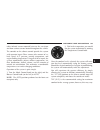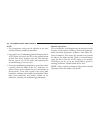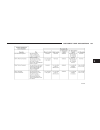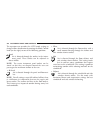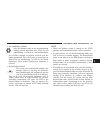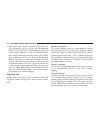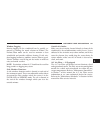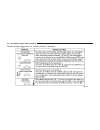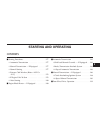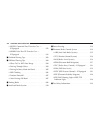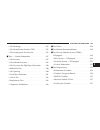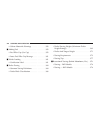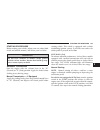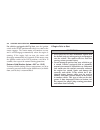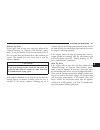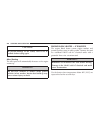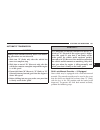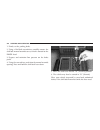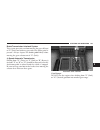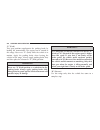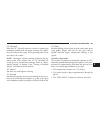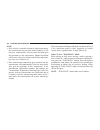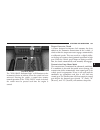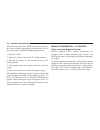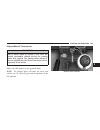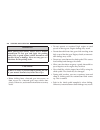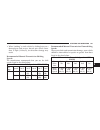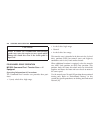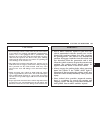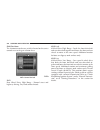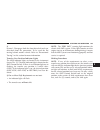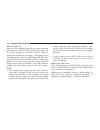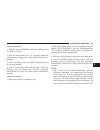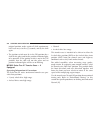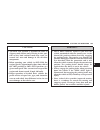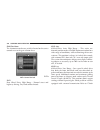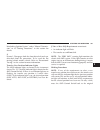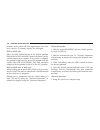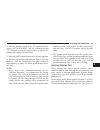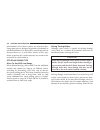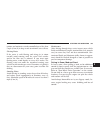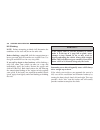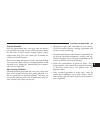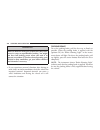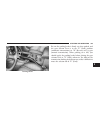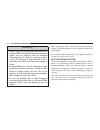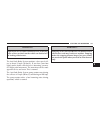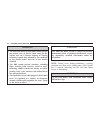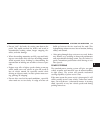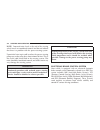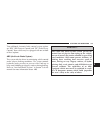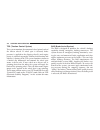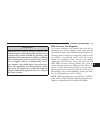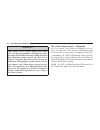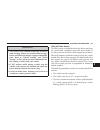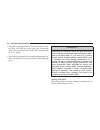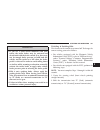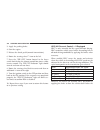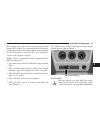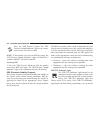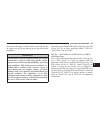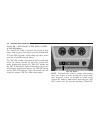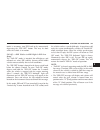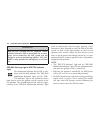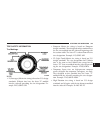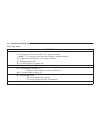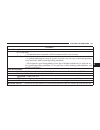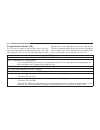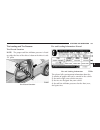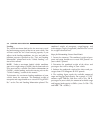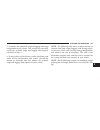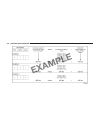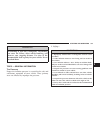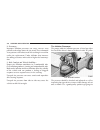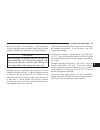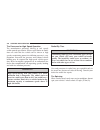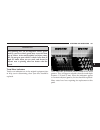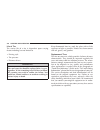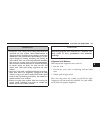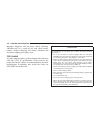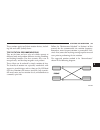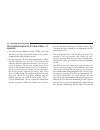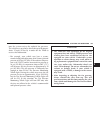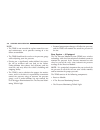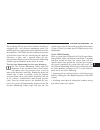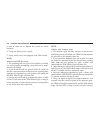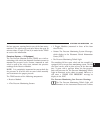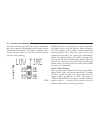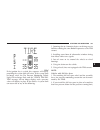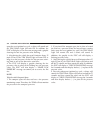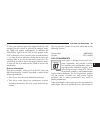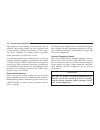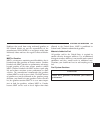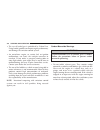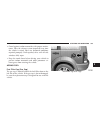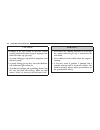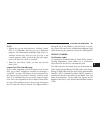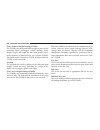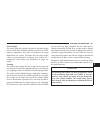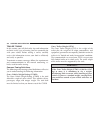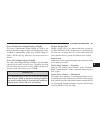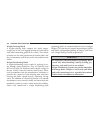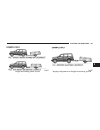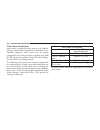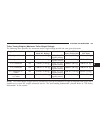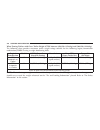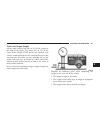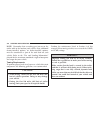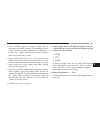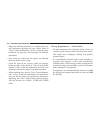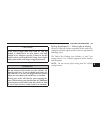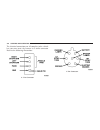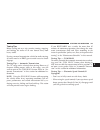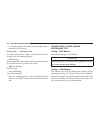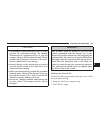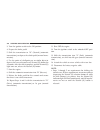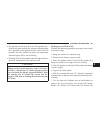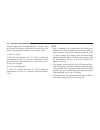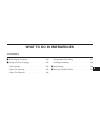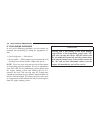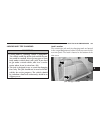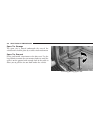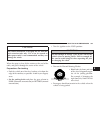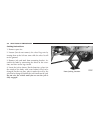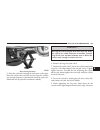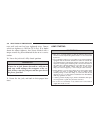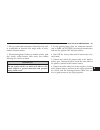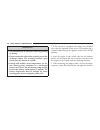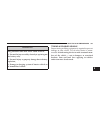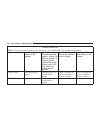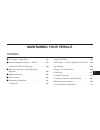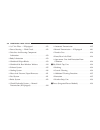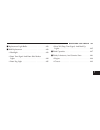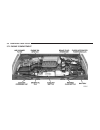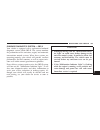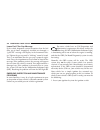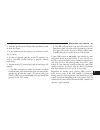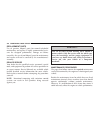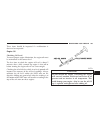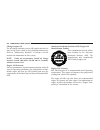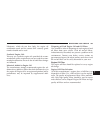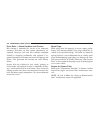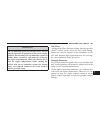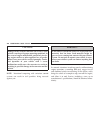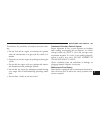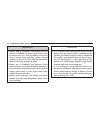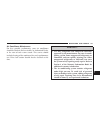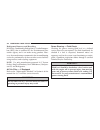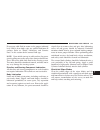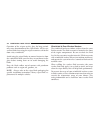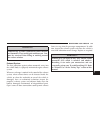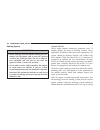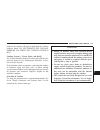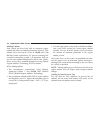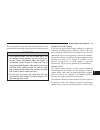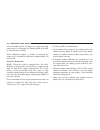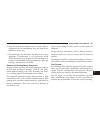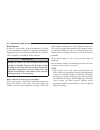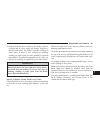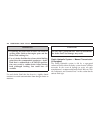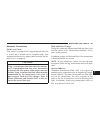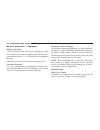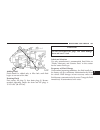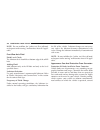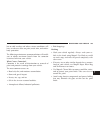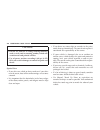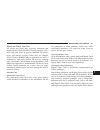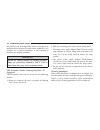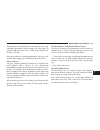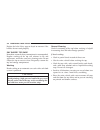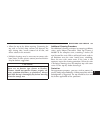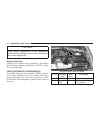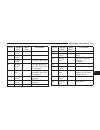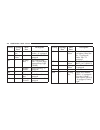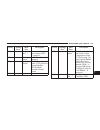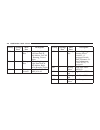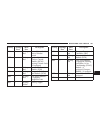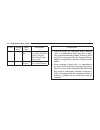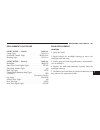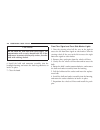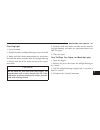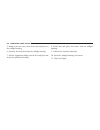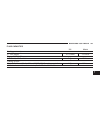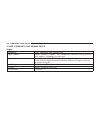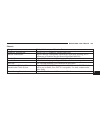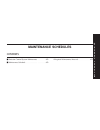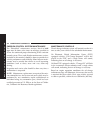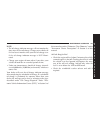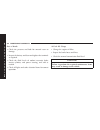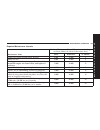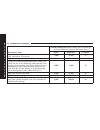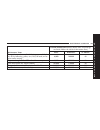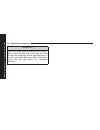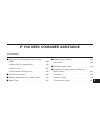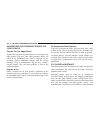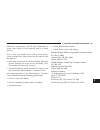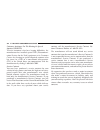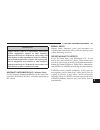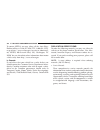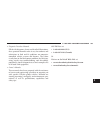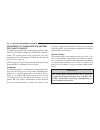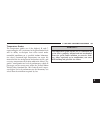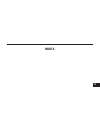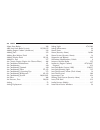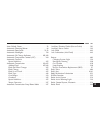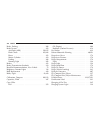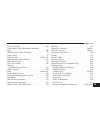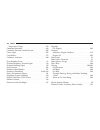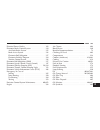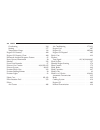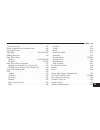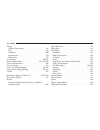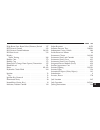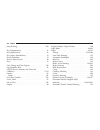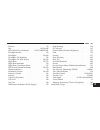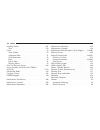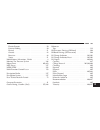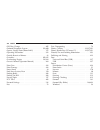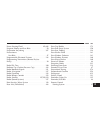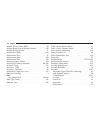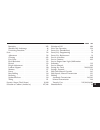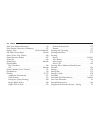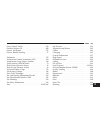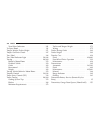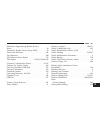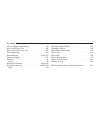- DL manuals
- Jeep
- Automobile
- 2008 Liberty
- Owner's Manual
Jeep 2008 Liberty Owner's Manual
TABLE OF CONTENTS
SECTION
PAGE
1
INTRODUCTION
. . . . . . . . . . . . . . . . . . . . . . . . . . . . . . . . . . . . . . . . . . . . . . . . . . . . . . . . . . . . . 3
2
THINGS TO KNOW BEFORE STARTING YOUR VEHICLE
. . . . . . . . . . . . . . . . . . . . . . . . . . . . . . . 9
3
UNDERSTANDING THE FEATURES OF YOUR VEHICLE
. . . . . . . . . . . . . . . . . . . . . . . . . . . . . . .83
4
INSTRUMENT PANEL AND CONTROLS
. . . . . . . . . . . . . . . . . . . . . . . . . . . . . . . . . . . . . . . . . 185
5
STARTING AND OPERATING
. . . . . . . . . . . . . . . . . . . . . . . . . . . . . . . . . . . . . . . . . . . . . . . . . 273
6
WHAT TO DO IN EMERGENCIES
. . . . . . . . . . . . . . . . . . . . . . . . . . . . . . . . . . . . . . . . . . . . . . .383
7
MAINTAINING YOUR VEHICLE
. . . . . . . . . . . . . . . . . . . . . . . . . . . . . . . . . . . . . . . . . . . . . . . 395
8
MAINTENANCE SCHEDULES
. . . . . . . . . . . . . . . . . . . . . . . . . . . . . . . . . . . . . . . . . . . . . . . . . . 451
9
IF YOU NEED CONSUMER ASSISTANCE
. . . . . . . . . . . . . . . . . . . . . . . . . . . . . . . . . . . . . . . . . .459
10
INDEX
. . . . . . . . . . . . . . . . . . . . . . . . . . . . . . . . . . . . . . . . . . . . . . . . . . . . . . . . . . . . . . . . . . . . 469
1
2
3
4
5
6
7
8
9
10
Summary of 2008 Liberty
Page 1
Table of contents section page 1 introduction . . . . . . . . . . . . . . . . . . . . . . . . . . . . . . . . . . . . . . . . . . . . . . . . . . . . . . . . . . . . . 3 2 things to know before starting your vehicle . . . . . . . . . . . . . . . . . . . . . . . . . . . . . . . 9 3 understanding the ...
Page 3: Introduction
Introduction contents m introduction . . . . . . . . . . . . . . . . . . . . . . . . . . . 4 m rollover warning . . . . . . . . . . . . . . . . . . . . . . . . 4 m how to use this manual . . . . . . . . . . . . . . . . . . 5 m warnings and cautions . . . . . . . . . . . . . . . . . . . 7 m vehicle i...
Page 4
Introduction this manual has been prepared with the assistance of service and engineering specialists to acquaint you with the operation and maintenance of your new vehicle. It is supplemented by a warranty information booklet and various customer oriented documents. You are urged to read these publ...
Page 5
Failure to use driver and passenger seat belts provided is a major cause of severe or fatal injury. In fact, the u.S. Government notes that the universal use of existing seat belts could cut the highway death toll by 10,000 or more each year, and could reduce disabling injuries by 2 million annually...
Page 6
6 introduction.
Page 7
Warnings and cautions this manual contains warnings against operating procedures, which could result in an accident or bodily injury. It also contains cautions against procedures, which could result in damage to your vehicle. If you do not read this entire manual, you may miss important information....
Page 8
Vehicle modifications / alterations warning! Any modifications or alterations to this vehicle could seriously affect its roadworthiness and safety and may lead to an accident resulting in serious injury or death. 8 introduction.
Page 9: Contents
Things to know before starting your vehicle contents m a word about your keys . . . . . . . . . . . . . . . . . .12 ▫ ignition key removal . . . . . . . . . . . . . . . . . . .12 ▫ key-in-ignition reminder . . . . . . . . . . . . . . . .14 m sentry key . . . . . . . . . . . . . . . . . . . . . . . ....
Page 10
▫ to unlatch the liftgate flip-up window . . . . .24 ▫ using the panic alarm . . . . . . . . . . . . . . . . . .24 ▫ programming additional transmitters . . . . . . . .25 ▫ battery replacement . . . . . . . . . . . . . . . . . . . .25 ▫ general information . . . . . . . . . . . . . . . . . . . .26 m...
Page 11
▫ driver and front passenger supplemental restraint system (srs) - airbag . . . . . . . . . . . .52 ▫ child restraint . . . . . . . . . . . . . . . . . . . . . . . .69 m engine break-in recommendations . . . . . . . . . . .79 m safety tips . . . . . . . . . . . . . . . . . . . . . . . . . . . .79 ▫ ...
Page 12
A word about your keys you can insert the double-sided keys into the locks with either side up. The dealer that sold you your new vehicle has the key code numbers for your vehicle locks. These numbers can be used to order duplicate keys from your dealer. Ask your dealer for these numbers and keep th...
Page 13
Manual transmission — if equipped turn the key to the acc position and then push the key and cylinder inward slightly and rotate the key to the lock position. Then remove the key. Note: • for vehicles not equipped with the electronic vehicle information center (evic), features such as the power wind...
Page 14
Warning! Never leave children alone in a vehicle. Leaving children in a vehicle unattended is dangerous for a number of reasons. A child or others could be seri- ously or fatally injured. Don’t leave the key in the ignition. A child could operate power windows, other controls, or move the vehicle. C...
Page 15
The vehicle. The system will shut the engine off in two (2) seconds if someone uses an invalid key to start the engine. Note: a key, which has not been programmed, is also considered an invalid key even if it is cut to fit the ignition switch lock cylinder for that vehicle. During normal operation, ...
Page 16
Replacement keys note: only keys that are programmed to the vehicle electronics can be used to start and operate the vehicle. Once a sentry key is programmed to a vehicle, it cannot be programmed to any other vehicle. Caution! Always remove sentry keys from the vehicle and lock all doors when leavin...
Page 17
Addition, the vehicle security alarm indicator light will begin to flash. Turn the ignition switch to the “lock” position and remove the second key. 4. Insert a blank sentry key into the ignition switch. Turn the ignition switch to the “on” position within 60 seconds. After 10 seconds, a single chim...
Page 18
Steering wheel lock — if equipped your vehicle may be equipped with a passive steering wheel lock (manual transmission only). This lock pre- vents steering the vehicle without the ignition key. If the steering wheel is moved a half turn in either direction and the key is not in the ignition, the ste...
Page 19
Rearming of the system: if something triggers the alarm, and no action is taken to disarm it, the system will turn off the horn after 3 minutes, turn off all of the visual signals after 15 minutes, and then the system will rearm itself. To arm the system: 1. Remove the key from the ignition switch a...
Page 20
The security alarm system is designed to protect your vehicle; however, you can create conditions where the system will give you a false alarm. If the previously described arming sequence has occurred, the system will arm regardless of whether you are inside or outside the vehicle. If you remain ins...
Page 21
Note: inserting the key into the ignition switch dis- ables all buttons on the transmitter. To unlock the doors and liftgate: press and release the unlock button on the transmitter once to unlock the driver’s door, or twice to unlock all doors and the liftgate. The turn signal lights will flash to a...
Page 22
3. Test the feature from outside the vehicle by pressing the lock and unlock buttons on the transmitter. 4. Repeat these steps if you want to return this feature to its previous setting. Note: pressing the lock button on the transmitter while you are inside the vehicle will activate the security ala...
Page 23
• for vehicles not equipped with the evic, perform the following steps: 1. Press the lock button on a programmed (i.E. Func- tional) transmitter for at least 4 seconds, but no longer than 10 seconds. Then, press the panic button while still holding the lock button. 2. Release both buttons at the sam...
Page 24
2. Release both buttons at the same time. 3. Test the feature from outside the vehicle by pressing the lock and unlock buttons on the transmitter. 4. Repeat these steps if you want to return this feature to its previous setting. Note: pressing the lock button on the transmitter while you are inside ...
Page 25
Headlights and turn signal lights will flash, the horn will pulse on and off, and the illuminated entry system will turn on. The panic alarm will stay on for 3 minutes unless you turn it off by pressing the panic button a second time or if the vehicle speed is 5 mph (8 km/h) or greater. During the p...
Page 26
2. With the transmitter buttons facing down, use a flat blade tool to pry the two halves of the transmitter case apart. Make sure not to damage the seal during removal. 3. Remove and replace the batteries. Avoid touching the new batteries with your fingers. Skin oils may cause battery deterioration....
Page 27
Note: changes or modifications not expressly ap- proved by the party responsible for compliance could void the user’s authority to operate the equipment. If your keyless entry transmitter fails to operate from a normal distance, check for these two conditions. 1. Weak batteries in transmitter. The e...
Page 28
How to use remote start all of the following conditions must be met before the engine will remote start: • gear selector lever in “p” (park). • doors closed. • hood closed. • liftgate closed. • hazard switch off. • brake switch inactive (brake pedal not pressed). • ignition key removed from ignition...
Page 29
To exit remote start mode & drive the vehicle before the end of the 15-minute cycle, press and release the unlock button on the rke transmitter to unlock the doors and disarm the vehicle security alarm (if equipped). Then, insert the key into the ignition switch and turn the switch to the on positio...
Page 30
If the door lock plunger is down when you shut the door, the door will lock. Therefore, make sure the keys are not inside the vehicle before closing the door. Note: the manual door locks will not lock or unlock the liftgate. Warning! • for personal security and safety in the event of an accident, lo...
Page 31
Power door locks a power door lock switch is on each front door trim panel. Use this switch to lock or unlock the doors and liftgate. If you press the power door lock switch while the key is in the ignition, and any front door is open, the power locks will not operate. This prevents you from acciden...
Page 32
Automatic door locks programming the automatic door locks feature can be enabled or disabled as follows: • for vehicles equipped with the electronic vehicle information center (evic), refer to “personal settings (customer programmable features)” under “elec- tronic vehicle information center (evic)”...
Page 33
5. The doors were not previously unlocked. 6. The vehicle speed is 0 mph (0 km/h). Automatic unlock doors on exit programming the automatic unlock doors on exit feature can be enabled or disabled as follows: • for vehicles equipped with the electronic vehicle information center (evic), refer to “per...
Page 34
2. Insert the tip of the ignition key into the child lock control and rotate it to the lock position. 3. Repeat steps 1 and 2 on the opposite rear door. Note: when the child lock system is engaged, the door can be opened only by using the outside door handle even though the inside door lock is in th...
Page 35
• for emergency exit with the system engaged, move the lock plunger up (unlocked position), roll down the window, and open the door with the outside door handle. To disengage the child protection door lock 1. Open the rear door. 2. Insert the tip of the ignition key into the child lock control and r...
Page 36
Windows power windows the window controls on the driver’s door trim panel control all the door windows. There are single window controls on each passenger door trim panel, which operate the passenger door windows. The window controls will operate when the ignition switch is in the on or acc position...
Page 37
To open the window part way, press the window switch to the first detent and release it when you want the window to stop. To stop the window from going all the way down during the auto-down operation, pull up on the switch briefly. For vehicles not equipped with the electronic vehicle information ce...
Page 38
Will remain active for 45 seconds after the ignition switch is turned to the lock position. Opening either front door will cancel this feature. For vehicles equipped with the evic, the power window switches will remain active for up to 10 minutes after the ignition switch is turned to the lock posit...
Page 39
Reset it may be necessary at some point in time to reactivate the auto-up feature. To do so, perform the following procedure: 1. Pull the window switch up to close window com- pletely and continue to hold the switch up for an additional two seconds after the window is closed. 2. Push the window swit...
Page 40
Liftgate to open the liftgate, pull up (squeeze) on the handle and lift. Note: use the power door lock switch on either front door trim panel or the remote keyless entry (rke) transmitter to lock and unlock the liftgate. The manual door locks on the doors and the driver’s door lock cylinder will not...
Page 41
Occupant restraints some of the most important safety features in your vehicle are the restraint systems. These include the front and rear seat belts for the driver and all passengers, front airbags for both the driver and front passenger, and side curtain airbags for the driver and passengers seate...
Page 42
Inside of the vehicle. Everyone in a motor vehicle should be belted at all times to reduce or prevent injuries. Lap/shoulder belts all seating positions in your vehicle have combination lap/shoulder belts. The belt webbing retractor is de- signed to lock during very sudden stops or collisions. This ...
Page 43
Lap/shoulder belt operating instructions 1. Enter the vehicle and close the door. Sit back and adjust the seat. 2. The seat belt latch plate is above the back of your seat. Grasp the latch plate and pull out the belt. Slide the latch plate up the webbing as far as necessary to make the belt go aroun...
Page 44
3. When the belt is long enough to fit, insert the latch plate into the buckle until you hear a “click.” warning! • a belt that is buckled into the wrong buckle will not protect you properly. The lap portion could ride too high on your body, possibly causing internal injuries. Always buckle your bel...
Page 45
4. Position the lap belt across your thighs, below your abdomen. To remove slack in the lap belt portion, pull up a bit on the shoulder belt. To loosen the lap belt if it is too tight, tilt the latch plate and pull on the lap belt. A snug belt reduces the risk of sliding under the belt in a collisio...
Page 46
6. To release the belt, push the red button on the buckle. The belt will automatically retract to its stowed position. If necessary, slide the latch plate down the webbing to allow the belt to retract fully. Warning! A frayed or torn belt could rip apart in a collision and leave you with no protecti...
Page 47
As a guide, if you are shorter than average, you will prefer a lower position, and if you are taller than average, you will prefer a higher position. When you release the anchorage, try to move it up and down to make sure that it is locked in position. Lap/shoulder belt untwisting procedure use the ...
Page 48
Enhanced seat belt use reminder system (beltalert) if the driver’s or front passenger’s seat belt has not been buckled within 60 seconds of starting the vehicle, and if the vehicle speed is greater than 5 mph (8 km/h), the enhanced warning system (beltalert) will alert the driver or front passenger ...
Page 49
3. Within 60 seconds of turning the ignition switch to the on position, unbuckle and then re-buckle the driver’s seat belt at least three times within 10 seconds, ending with the seat belt buckled. Note: watch for the seat belt reminder light to turn on while unbuckling the seat belt and turn off wh...
Page 50
How to disengage the automatic locking mode disconnect the combination lap/shoulder belt from the buckle and allow it to retract completely to disengage the automatic locking mode and activate the vehicle sensitive (emergency) locking mode. Energy management feature this vehicle has a safety belt sy...
Page 51
Keep the belt low so that it does not come across the abdomen. That way the strong bones of the hips will take the force if there is a collision. Seat belt extender if a seat belt is too short, even when fully extended, and when the adjustable upper shoulder belt anchorage (if so equipped) is in its...
Page 52
Driver and front passenger supplemental restraint system (srs) - airbag this vehicle has airbags for both the driver and front passenger as a supplement to the seat belt restraint systems. The driver’s airbag is mounted in the steering wheel. The passenger’s front airbag is mounted in the instrument...
Page 53
The front airbags have a multistage inflator design. This may allow the airbag to have different rates of inflation that are based on collision severity and occupant size. The front passenger airbag is also certified to the federal regulations that define occupant classification (refer to informatio...
Page 54
Warning! • do not put anything on or around the front and side curtain airbag covers or attempt to manually open them. You may damage the airbags and you could be injured because the airbags are no longer functional. These protective covers for the airbag cushions are designed to open only when the ...
Page 55
Classified in a category other than that of an adult (refer to information on occupant classification system in this section). This could be a child, teenager, or even a small size adult. Here are some simple steps you can take to minimize the risk of harm from a deploying airbag. 1. Children 12 yea...
Page 56
4. Do not lean against the door or window, airbags will inflate forcefully into the space between you and the door. 5. If the airbag system in this vehicle needs to be modified to accommodate a disabled person, contact the customer center. Phone numbers are provided under “if you need assistance” in...
Page 57
Airbag system components the airbag system consists of the following: • occupant restraint controller (orc) • airbag warning light • driver airbag • front passenger airbag • side curtain airbags above side windows • side remote acceleration sensors • steering wheel and column • instrument panel • in...
Page 58
The orc also monitors the readiness of the electronic parts of the system whenever the ignition switch is in the start or on position. These include all of the items listed above except the passenger airbag disable (pad) indicator light, the instrument panel, and the steering wheel and column. If th...
Page 59
Note: children 12 years and under should always ride buckled up in a rear seat in an appropriate child restraint. • the passenger airbag disable (pad) indicator light (an amber light located in the center of the instrument panel) tells the driver and front passenger when the front passenger airbag i...
Page 60
Is turned off and it will not inflate. If the “pad indicator light” is not illuminated, do not assume the airbag is turned off and move the child restraint to the rear seat. A deploying passenger airbag can cause death or serious injury to a child in a rear facing infant seat. Note: even though this...
Page 61
Will cause the system to turn the airbag on. In this case, the ocs has classified the occupant of the seat as an adult. An adult occupant needs to sit in a normal position (with their feet on or near the floor) in order to be properly classified. Reclining the seat back too far may change how an occ...
Page 62
Lodged under the seat and interferes with operation of the weight sensors, a fault will occur which turns on both the “pad indicator light” and the “airbag warning light.” once the lodged object is removed, the fault will be automatically cleared after a short period of time. • the driver and passen...
Page 63
• the side impact srs side curtain airbags are de- signed to activate only in certain side collisions and rollover events. When the orc detects a collision requiring the side curtain airbag to inflate, it signals the inflators on the crash side of the vehicle or both sides of the vehicle for a rollo...
Page 64
Warning! Unapproved modifications or service procedures to the front passenger seat assembly or its related com- ponents may inadvertently change the airbag deploy- ment in case of a frontal crash. This could result in death or serious injury to the front seat passenger if the vehicle is involved in...
Page 65
• as the airbags deflate, you may see some smoke-like particles. The particles are a normal by-product of the process that generates the nontoxic gas used for airbag inflation. These airborne particles may irritate the skin, eyes, nose, or throat. If you have skin or eye irritation, rinse the area w...
Page 66
• turns on the interior lights, which remain on as long as the battery has power or until the ignition key is removed. • unlocks the doors automatically. Note: the interior lights can only be deactivated if the key is removed from the ignition switch or the vehicle is driven. Maintaining your airbag...
Page 67
Note: perchlorate material – special handling may apply, see www.Dtsc.Ca.Gov/hazardouswaste/perchlorate airbag warning light you will want to have the airbag system ready to inflate for your protection in an impact. The airbag system is designed to be maintenance free. If any of the following occurs...
Page 68
In conjunction with other data gathered during a com- plete accident investigation, the electronic data may be used by daimlerchrysler corporation and others to learn more about the possible causes of crashes and associated injuries in order to assess and improve vehicle perfor- mance. In addition t...
Page 69
Data parameters that may be recorded: • diagnostic trouble code(s) and warning light status for electronically controlled safety systems, including the airbag system • airbag disable light status (if equipped) • 9time9 of airbag deployment (in terms of ignition cycles and vehicle mileage) • airbag d...
Page 70
Warning! In a collision, an unrestrained child, even a tiny baby, can become a missile inside the vehicle. The force required to hold even an infant on your lap can become so great that you could not hold the child, no matter how strong you are. The child and others could be badly injured. Any child...
Page 71
“latch — child seat anchorage system (lower anchors and tether for children)” in this section. • rearward-facing child seats must never be used in the front seat of a vehicle with the front passenger airbag unless the airbag is turned off. An airbag deployment could cause severe injury or death to i...
Page 72
• check belt fit periodically. A child’s squirming or slouching can move the belt out of position. • if the shoulder belt contacts the face or neck, move the child closer to the center of the vehicle. Never allow a child to put the shoulder belt under an arm or behind their back. Note: for additiona...
Page 73
Here are some tips on getting the most out of your child restraint: • before buying any restraint system, make sure that it has a label certifying that it meets all applicable safety standards. The manufacturer also recommends that you try a child restraint in the vehicle seats where you will use it...
Page 74
Connection to the top tether anchorages have been avail- able for some time. For some older child restraints, many child restraint manufacturers offer add-on tether strap kits or retrofit kits. You are urged to take advantage of all the available attachments provided with your child re- straint in a...
Page 75
The rear seat lower anchorages are round bars, located at the rear of the seat cushion where it meets the seat back, and are just visible when you lean into the rear seat to install the child restraint. You will easily feel them if you run your finger along the intersection of the seatback and seat ...
Page 76
Means of adjusting the tension in the strap. Forward- facing toddler restraints and some rear-facing infant restraints will also be equipped with a tether strap, a hook for attachment to the tether strap anchorage and a means of adjusting the tension of the strap. You will first loosen the adjusters...
Page 77
Belt. However, any seat belt system may loosen with time, so check the belt occasionally, and pull it tight if necessary. If the seat belt has an automatic locking retractor, pull the belt from the retractor until there is enough to allow you to pass through the child restraint and slide the latch p...
Page 78
To attach a child restraint tether strap: route the tether strap over the seat back and attach the hook to the tether anchor located on the back of the seat. For the outboard seating positions, route the tether underneath the headrest and attach the hook to the tether anchor located on the back of t...
Page 79
Engine break-in recommendations a long break-in period is not required for the engine in your new vehicle. Drive moderately during the first 300 miles (500 km). After the initial 60 miles (100 km), speeds up to 50 or 55 mph (80 or 90 km/h) are desirable. While cruising, brief full-throttle accelerat...
Page 80
Warning! It is extremely dangerous to ride in a cargo area, inside or outside of a vehicle. In a collision, people riding in these areas are more likely to be seriously injured or killed. Do not allow people to ride in any area of your vehicle that is not equipped with seats and seat belts. Be sure ...
Page 81
Inspect the exhaust system each time the vehicle is raised for lubrication or oil change. Replace as required. Warning! • exhaust gases can injure or kill. They contain carbon monoxide (co) which is colorless and odorless. Breathing it can make you unconscious and can eventually poison you. To avoid...
Page 82
Defroster check operation by selecting the defrost mode and place the blower control on high speed. You should be able to feel the air directed against the windshield. See your authorized dealer for service if your defroster is inoper- able. Periodic safety checks you should make outside the vehicle...
Page 83: Contents
Understanding the features of your vehicle contents m mirrors . . . . . . . . . . . . . . . . . . . . . . . . . . . . . . .88 ▫ inside day/night mirror . . . . . . . . . . . . . . . . .88 ▫ automatic dimming mirror — if equipped . . . .88 ▫ outside mirrors . . . . . . . . . . . . . . . . . . . . . ....
Page 84
M seats . . . . . . . . . . . . . . . . . . . . . . . . . . . . . . . . 118 ▫ manual front seat adjustments . . . . . . . . . . . 118 ▫ power seat — if equipped . . . . . . . . . . . . . . . 121 ▫ head restraints . . . . . . . . . . . . . . . . . . . . . . 122 ▫ heated seats — if equipped . . . . . ...
Page 85
▫ flash to pass . . . . . . . . . . . . . . . . . . . . . . . . 137 ▫ interior lights . . . . . . . . . . . . . . . . . . . . . . . 138 m windshield wipers and washers . . . . . . . . . . . . 140 ▫ intermittent wiper system . . . . . . . . . . . . . . . 141 ▫ mist feature . . . . . . . . . . . . . ....
Page 86
▫ using homelinkt . . . . . . . . . . . . . . . . . . . . . 159 ▫ reprogramming a single homelinkt button . . . . . . . . . . . . . . . . . . . . . . . . . . . . . 160 ▫ security . . . . . . . . . . . . . . . . . . . . . . . . . . . . 160 ▫ troubleshooting tips . . . . . . . . . . . . . . . . . . . ...
Page 87
M power inverter — if equipped . . . . . . . . . . . . . 170 m cup holders . . . . . . . . . . . . . . . . . . . . . . . . . . 172 m storage . . . . . . . . . . . . . . . . . . . . . . . . . . . . . . 173 ▫ front storage compartment . . . . . . . . . . . . . . 173 ▫ console storage compartment . . ....
Page 88
Mirrors inside day/night mirror adjust the mirror to center on the view through the rear window. A two-point pivot system allows for horizontal and vertical mirror adjustment. Annoying headlight glare can be reduced by moving the small control under the mirror to the night position (toward rear of v...
Page 89
Caution! To avoid damage to the mirror during cleaning, never spray any cleaning solution directly onto the mirror. Apply the solution onto a clean cloth and wipe the mirror clean. Outside mirrors to receive maximum benefit, adjust the outside mirror(s) to center on the adjacent lane of traffic and ...
Page 90
Exterior mirrors folding feature — if equipped some models have exterior mirrors that are hinged. The hinge allows the mirror to pivot forward and rearward to resist damage. The hinge has three detent positions, forward, rearward, and normal. Power remote control mirrors the power mirror switch is l...
Page 91
Models with express window feature press and release the mirror select button marked l or r and then press one of the four arrow buttons to move the mirror in the direction the arrow is pointing. The selec- tion will time out after 30 seconds of inactivity to guard against accidentally moving a mirr...
Page 92
Sun visor “slide-out” feature — if equipped the sun visor “slide-on rod” feature allows for additional flexibility in positioning the visor to block out the sun. 1. Fold down sun visor. 2. Unclip visor from center clip. 3. Pull the sun visor toward inside rearview mirror to extend. Hands–free commun...
Page 93
Uconnect t allows you to transfer calls between the system and your cellular phone as you enter or exit your vehicle, and enables you to mute the system’s micro- phone for private conversation. The uconnect t phone book enables you to store up to 32 names and four numbers per name. Each language has...
Page 94
You may not be able to use any uconnect t features. Refer to your cellular service provider or the phone manufacturer for details. The uconnect t system is fully integrated with the vehi- cle’s audio system. The volume of the uconnect t system can be adjusted either from the radio volume control kno...
Page 95
Voice command tree refer to “voice tree” at the end of this section. Help command if you need assistance at any prompt, or if you want to know your options at any prompt, say 9help9 following the beep. The uconnect t system will play all the options at any prompt if you ask for help. To activate the...
Page 96
You can enter any four-digit pin number. You will not need to remember this pin number after the initial pairing process. • for identification purposes, you will be prompted to give the uconnect t system a name for your cellular phone. Each cellular phone that is paired should be given a unique phon...
Page 97
• the uconnectt system will confirm the phone num- ber and then dial. The number will appear in the display of certain radios. Call by saying a name • press the “phone” button to begin. • after the 9ready9 prompt and the following beep, say “call. 9 • system will prompt you to say the name of the pe...
Page 98
• when prompted, recite the phone number for the phone book entry that you are adding. After you are finished adding an entry into the phone book, you will be given the opportunity to add more phone numbers to the current entry or to return to the main menu. The uconnect t system will allow you to e...
Page 99
Edit entries in the uconnect t phonebook note: editing names in the phone book is recom- mended when vehicle is not in motion. • press the “phone” button to begin. • after the 9ready9 prompt and the following beep, say 9phonebook edit.9 • you will then be asked for the name of the phone book entry t...
Page 100
From the list, press the 9voice recognition9 button while the uconnect t system is playing the desired entry and say 9delete.9 • after you enter the name, the uconnectt system will ask you which designation you wish to delete, home, work, mobile, pager, or all. Say the designation you wish to delete...
Page 101
• the uconnectt system will then prompt you as to the number designation you wish to call. • the selected number will be dialed. Phone call features the following features can be accessed through the uconnect t system if the feature(s) are available on your cellular service plan. For example, if you...
Page 102
Entry you wish to call. The first call will be on hold while the second call is in progress. To go back to the first call, refer to 9toggling between calls.9 to combine two calls, refer to 9conference call.9 place/retrieve a call from hold to put a call on hold, press the 8phone’ button until you he...
Page 103
Hold may not become active automatically. This is cell phone dependent. To bring the call back from hold, press and hold the “phone” button until you hear a single beep. Redial • press the “phone” button to begin. • after the 9ready9 prompt and the following beep, say 9redial.9 • the uconnectt syste...
Page 104
Uconnect t system features language selection to change the language that the uconnect t system is using, • press the “phone” button to begin. • after the 9ready9 prompt and the following beep, say the name of the language you wish to switch to (english, espanol, or francais, if so equipped). • cont...
Page 105
The uconnect t system does slightly lower your chances of successfully making a phone call as to that for the cell phone directly. Your phone must be turned on and paired to the ucon- nect t system to allow use of this vehicle feature in emergency situations when the cell phone has network coverage ...
Page 106
Service or automated customer service. Some services require immediate response selection, in some instances, that may be too quick for use of uconnect t system. When calling a number with your uconnect t system that normally requires you to enter in a touch-tone sequence on your cellular phone keyp...
Page 107
A {,9 you could press the “voice recognition” button and say 9pair a phone9 to select that option without having to listen to the rest of the voice prompt. Turning confirmation prompts on/off turning confirmation prompts off will stop the system from confirming your choices (e.G., the uconnect t sys...
Page 108
May feel that the call did not go through even though the call is in progress. Once your call is answered, you will hear the audio. Mute/un-mute (mute off) when you mute the uconnect t system, you will still be able to hear the conversation coming from the other party, but the other party will not b...
Page 109
List paired cellular phone names • press the “phone” button to begin. • after the “ready” prompt and the following beep, say “setup phone pairing.” • when prompted, say 9list phones.9 • the uconnectt system will play the phone names of all paired cellular phones in order from the highest to the lowe...
Page 110
• you can also press the “voice recognition” button anytime while the list is being played, and then choose the phone you wish to delete. Things you should know about your uconnect t system uconnect t tutorial to hear a brief tutorial of the system features, press the “phone” button and say “uconnec...
Page 111
• always wait for the beep before speaking. • speak normally, without pausing, just as you would speak to a person sitting approximately eight (8) feet away from you. • make sure that no one other than you is speaking during a voice recognition period. • performance is maximized under: • low-to-medi...
Page 112
• even though international dialing for most number combinations is supported, some shortcut dialing number combinations may not be supported. • in a convertible vehicle, system performance may be compromised with the convertible top down. Far end audio performance • audio quality is maximized under...
Page 113
Understanding the features of your vehicle 113 3.
Page 114
114 understanding the features of your vehicle.
Page 115
Understanding the features of your vehicle 115 3.
Page 116
Voice commands primary alternate(s) zero one two three four five six seven eight nine star (*) plus (+) pound (#) add location all voice commands primary alternate(s) call cancel confirmation prompts. Continue delete dial download edit emergency english erase all espanol francais help home 116 under...
Page 117
Voice commands primary alternate(s) language list names list phones mobile mute mute off new entry no pager pair a phone phone pairing pairing phonebook phone book previous record again redial voice commands primary alternate(s) return to main menu return or main menu select phone select send set up...
Page 118
General information this device complies with part 15 of the fcc rules and rss 210 of industry canada. Operation is subject to the following conditions: • this device may not cause harmful interference. • this device must accept any interference received, including interference that may cause undesi...
Page 119
Warning! Adjusting a seat while the vehicle is moving is dangerous. The sudden movement of the seat could cause you to lose control. The seat belt might not be properly adjusted and you could be injured. Adjust any seat only while the vehicle is parked. Recliner adjustment the recliner control is on...
Page 120
Warning! • adjusting a seat while the vehicle is moving is dangerous. The sudden movement of the seat could cause you to lose control. The seat belt might not be properly adjusted and you could be injured. Adjust the seat only while the vehicle is parked. • do not ride with the seatback reclined so ...
Page 121
Power seat — if equipped the power seat switch is on the outboard side of the seat near the floor. For vehicles equipped with a power driver’s seat, use this switch to move the seat up, down, forward, rearward, or to tilt the seat. For vehicles equipped with a power passenger seat, use this switch t...
Page 122
Caution! Do not place any article under any seat as it may cause damage to the seat controls. Warning! Adjusting a seat while the vehicle is moving is dangerous. The sudden movement of the seat could cause you to lose control. The seat belt might not be properly adjusted and you could be injured. Ad...
Page 123
Heated seats — if equipped heated seats provide comfort and warmth on cold days and can help soothe sore muscles and backs. The heaters provide the same heat level for both cushion and back. The driver and front passenger seats are heated. The controls for each heater are located near the bottom cen...
Page 124
Press the switch once to select high-level heating. Press the switch a second time to select low-level heating. Press the switch a third time to shut off the heating elements. When high-temperature heating is selected, the heaters provide a boosted heat level during the first four minutes of operati...
Page 125
Note: prior to folding the rear seat, it may be necessary to position the front seat to its mid-track position. Also, be sure that the front seats are fully upright and posi- tioned forward. This will allow the rear seat to fold down easily. Warning! • it is extremely dangerous to ride in a cargo ar...
Page 126
4. If desired, push down on the seatback to lock it in the folded position. To raise the rear seat note: if interference from the cargo area prevents the seatback from fully locking, you will have difficulty returning the seat to its proper position. 1. If locked in the folded position, pull the rel...
Page 127
Driver memory seat — if equipped this feature allows the driver to store up to two different memory profiles, for easy recall through a memory switch. Each memory profile contains desired position settings for the driver seat and side mirrors, and a set of desired radio station presets. The memory s...
Page 128
Note: • for vehicles equipped with an automatic transmission, memory profiles can be set without the vehicle in “p” (park), but the vehicle must be in “p” (park) to recall a memory profile. • for vehicles equipped with a manual transmission, the vehicle speed must be at 0 mph (0 km/h) to recall a me...
Page 129
Note: your transmitters can be unlinked to the memory setting by pressing the set (s) button followed by the unlock button on the transmitter in step 4 above. Memory position recall note: • for vehicles equipped with an automatic transmission, the vehicle must be in “p” (park) to recall memory posit...
Page 130
The distance the driver seat moves depends on where you have the driver seat positioned when you remove the key from the ignition switch. • when you remove the key from the ignition switch, the driver seat will move about 2.4 inches (60 mm) rearward if the driver seat position is greater than or equ...
Page 131
To open and close the hood two latches must be released to open the hood. First, pull the hood release lever located under the left side of the instrument panel. Next, locate the safety latch lever between the grille and hood opening (left of center when facing hood). Push the safety latch lever to ...
Page 132
Use the hood prop rod to secure the hood in the open position. Place the upper end of the prop rod in the hole on the underside of the hood. To prevent possible damage: • before closing hood, make sure the hood prop rod is fully seated into its storage retaining clips. • do not slam the hood to clos...
Page 133
Lights exterior & interior lighting control the multi-function control lever on the left side of the steering column controls the operation of the headlights, parking lights, turn signal lights, instrument panel lights, instrument panel light dimming, interior lights, and fog lights (if equipped). H...
Page 134
Automatic headlights — if equipped this system automatically turns the headlights on or off according to ambient light levels. To turn the system on, turn the end of the multi-function control lever to the (a) auto position (third detent). When the system is on, the headlight time delay feature is a...
Page 135
Interval begins when you turn off the headlights. Only the headlights will illuminate during this time. If you turn the headlights, or parking lights, or ignition switch on again, the system will cancel the delay. If you turn the headlights off before the ignition, they will turn off in the normal m...
Page 136
Fog lights — if equipped to activate the front fog lights, turn on the parking lights or the low beam headlights and pull out on the end of the multi-function control lever. Note: the front fog lights will only operate with the headlights on low beam. Selecting high beam headlights will turn off the...
Page 137
You can signal a lane change by moving the lever upward or downward partially without moving beyond the de- tent. If either turn signal indicator has a very fast flash rate, check for a defective outside light bulb. If an indicator fails to light when the lever is moved, see your autho- rized dealer...
Page 138
Note: if the multi-function control lever is held in the flash to pass position for more than 15 seconds, the high beams will shut off. If this occurs, wait 30 seconds before activating the flash to pass function again. Interior lights map/reading lights these lights are mounted between the sun viso...
Page 139
Instrument panel dimming with the parking lights or headlights on, rotate the dimmer control upward or downward to change the brightness of the instrument panel lights. Parade mode (daytime brightness feature) rotate the dimmer control to the first detent to brighten the odometer and radio display w...
Page 140
Windshield wipers and washers the windshield wiper / washer control lever is located on the right side of the steering column. Rotate the end of the lever to the first detent past the intermittent settings for low-speed wiper operation, or to the second detent past the intermittent settings for high...
Page 141
Caution! • turn the windshield wipers off when driving through an automatic car wash. Damage to the windshield wipers may result if the wiper control is left in any position other than off. • in cold weather, always turn off the wiper switch and allow the wipers to return to the park position before...
Page 142
Warning! Sudden loss of visibility through the windshield could lead to an accident. You might not see other vehicles or other obstacles. To avoid sudden icing of the windshield during freezing weather, warm the windshield with defroster before and during wind- shield washer use. Mist feature push d...
Page 143
Headlights with wipers (available with auto headlights only) when this feature is active, the headlights will turn on approximately 10 seconds after the wipers are turned on if the multi-function control lever (on the left side of the steering column) is placed in the (a) auto position. In addition,...
Page 144
Note: • the rain-sensing feature will not operate when the wiper speed is in the low or high position. • the rain-sensing feature may not function properly when ice or dried salt water is present on the wind- shield. • use of rain-xt or products containing wax or silicone may reduce rain sensor perf...
Page 145
Remote start mode is exited. Refer to “remote start system” in section 2 of this manual for information on remote start operation. Windshield washers to use the washer, pull the windshield wiper / washer control lever toward you and hold it for as long as washer spray is desired. If you activate the...
Page 146
Tilt steering column this feature allows you to tilt the steering column upward or downward. The tilt control handle is located below the steering wheel at the end of the steering column. To unlock the steering column, push the control handle downward. To tilt the steering column, move the steering ...
Page 147
Electronic speed control — if equipped when engaged, this device takes over the accelerator operation at speeds greater than 25 mph (40 km/h). Electronic speed control operation the speed control lever is located on the right side of the steering wheel. To activate: push and release the (“on/off”) b...
Page 148
Warning! Leaving the electronic speed control system on when not in use is dangerous. You could accidentally set the system or cause it to go faster than you want. You could lose control and have an accident. Always leave the system off when you are not using it. To set at a desired speed: when the ...
Page 149
To resume speed: if you deactivated the speed control without erasing the set speed from memory and your vehicle speed is above 20 mph (32 km/h) you can resume the previous set speed. To do so, push the lever up and release (resume accel), and then remove your foot from the accelerator pedal. To var...
Page 150
Vehicles equipped with a manual transmission may need to be shifted into a lower gear to climb hills without speed loss. Warning! Speed control can be dangerous where the system can’t maintain a constant speed. Your vehicle could go too fast for the conditions, and you could lose control. An acciden...
Page 151
• when you move the shift lever to “r” (reverse) position and the rear park assist system is turned off, a single chime will sound once per ignition cycle and the instrument cluster will display “park assist disabled.” • the rear park assist system, when on, will mute the radio when it is sounding a...
Page 152
Warning! • drivers must be careful when backing up even when using the rear park assist system. Always check carefully behind your vehicle, look behind you, and be sure to check for pedestrians, animals, other vehicles, obstructions, and blind spots before back- ing up. You are responsible for safet...
Page 153
System operation the system uses four sensors located in the rear bumper fascia to scan for obstacles up to 79 inches (200 cm) away from the rear bumper fascia. The warning display located above the rear window provides both visible and audible warnings to indicate the range of the object. The warni...
Page 154
When the ignition is turned to the on position, and the system is enabled, the warning display will turn on all of its leds for approximately one second. Then, the system dimly illuminates the two outer most yellow leds when it is detecting no obstacles. The rear park assist system is active when th...
Page 155
Garage door opener — if equipped homelink t replaces up to three remote controls (hand held transmitters) that operate devices such as garage door openers, motorized gates, lighting, or home security systems. The homelink t unit operates off your vehicle’s battery. Note: homelink t is disabled when ...
Page 156
Warning! Vehicle exhaust contains carbon monoxide, a danger- ous gas. Do not run your vehicle in the garage while training the transceiver. Exhaust gas can cause seri- ous injury or death. Programming homelink t before you begin if you have not trained any of the homelink t buttons, erase all channe...
Page 157
Note: • some gate operators and garage door openers may require you to replace step #3 with procedures noted in the “gate operator/canadian programming” sec- tion. • after training a homelinkt channel, if the garage door does not operate with homelink t and the ga- rage door opener was manufactured ...
Page 158
This can usually be found where the hanging antenna wire is attached to the garage door opener motor (it is not the button normally used to open & close the door). 6. Firmly press and release the “learn” or “training” button. The name and color of the button may vary by manufacturer. Note: there are...
Page 159
Gate operator/canadian programming canadian radio-frequency laws require transmitter sig- nals to “time-out” (or quit) after several seconds of transmission – which may not be long enough for homelink t to pick up the signal during programming. Similar to this canadian law, some u.S. Gate operators ...
Page 160
Reprogramming a single homelink t button to re-program a channel that has been previously trained, follow these steps: 1. Turn the ignition switch to the on/run position. 2. Press and hold the desired homelink t button until the indicator light begins to flash after 20 seconds. Do not release the bu...
Page 161
General information this device complies with fcc rules part 15 and industry canada rss-210. Operation is subject to the following two conditions: 1. This device may not cause harmful interference 2. This device must accept any interference that may be received including interference that may cause ...
Page 162
Warning! • never leave children in a vehicle, with the keys in the ignition switch. Occupants, particularly unat- tended children, can become entrapped by the power sunroof while operating the power sunroof switch. Such entrapment may result in serious injury or death. • in an accident, there is a g...
Page 163
Sunroof will automatically retract. Remove the obstruc- tion if this occurs. Next, press the switch forward and release to express close. Pinch protect override if a known obstruction (ice, debris, etc.) prevents closing, press the switch forward and hold. This allows the sunroof to move towards the...
Page 164
Sunroof maintenance use only a non-abrasive cleaner and a soft cloth to clean the glass panel. Ignition off operation for vehicles not equipped with the electronic vehicle information center (evic), the power sunroof switch will remain active for 45 seconds after the ignition switch is turned to the...
Page 165
Caution! • never attempt to open or close the sky slidert when it is frozen. Wait until the sky slider t is thawed before operating. • opening the sky slidert when damp, wet, or dirty can cause stains, mildew, and damage to the soft-top material and the inside of your vehicle. Make sure the sky slid...
Page 166
Power top control the power top switch is located between the sun visors on the overhead console. Note: the power top switch will operate when the ignition switch is turned to the on or acc position, and when the accessory delay feature is active. Opening the sky slider t using automatic mode press ...
Page 167
Note: the sky slider t will not open from the front and the rear at the same time. The sky slider t must close fully before opening it from the opposite end. Using operator mode press the switch rearward and hold it and the sky slider t will open from the front and move toward the rear of the vehicl...
Page 168
To resume the operation from a partially closed position, press and hold the switch once again. Manually the sky slider t drive motors are mounted to the roof above the cargo lamp. In the event that your vehicle losses battery power, you can close the sky slider t by turning the drive gears in the a...
Page 169
Windows open, then open the front and rear windows together to minimize the buffeting. If the buffeting occurs with the sky slider t open, adjust the sky slidert opening to minimize the buffeting or open any window. Sky slider t maintenance refer to “sky slider t top care” under “maintaining your ve...
Page 170
Electrical outlet use with engine off caution! • many accessories that can be plugged in draw power from the vehicle’s battery, even when not in use (i.E. Cellular phones, etc.). Eventually, if plugged in long enough, the vehicle’s battery will discharge sufficiently to degrade battery life and/or p...
Page 171
A control switch for the outlet is located in the lower switch bank below the climate controls. Press and release the switch once to turn on the power outlet. A status indicator in the switch will illuminate in approximately one second to indicate that power is available at the outlet. Press and rel...
Page 172
Cup holders front and rear cup holders are located in the center console. Front cup holders rear cup holders 172 understanding the features of your vehicle.
Page 173
Storage front storage compartment the front storage compartment (located on the left side of the instrument panel) can hold cell phones, pda’s, and other small items. Console storage compartment to open, press the latch and lift the cover. Front storage compartment center console understanding the f...
Page 174
The center console has a removable storage tray, which can hold cell phones, pda’s, and other small items. Cargo area features cargo load floor the cargo load floor system has a load capacity of 400 lbs (181 kg). The load floor has a built-in storage bin that can hold a variety of items. The undersi...
Page 175
2. Pull the loops upward and twist them 1 ⁄ 4 turn so that they are parallel to the slots in the storage bin cover. 3. Lift the cover upward over the loops. 4. When done, reinstall the cover with the handle recess facing toward you. Note: you can install the cover with either side facing upward. 5. ...
Page 176
Cargo tie-down hooks & loops the tie-downs located on cargo area floor should be used to secure loads safely when the vehicle is moving. Note: the spring-loaded latches that retain the storage bin cover to the cargo load floor should not be used as cargo tie-downs. Cargo tie-down loops are located o...
Page 177
Warning! • cargo tie-downs are not safe anchors for a child seat tether strap. In a sudden stop or collision, a tie-down could pull loose and allow the child seat to come loose. A child could be badly injured. Use only the anchors provided for child seat tethers. • the weight and position of cargo a...
Page 178
Retractable cargo area cover — if equipped note: the purpose of this cover is for privacy, not to secure loads. It will not prevent cargo from shifting or protect passengers from loose cargo. The removable retractable cargo area cover mounts in the cargo area behind the top of the rear seats. The co...
Page 179
Next, grab the cover handle and pull the cover toward you. As the cover nears the liftgate opening, guide the rear attachment posts (on both ends of the cover) into the notches in the trim panels. Then, lower the cover to position the posts into the bottom of the notches and release the handle. Warn...
Page 180
Rear window features rear window wiper/washer — if equipped the rear window wiper / washer control is located on the right side of the steering column. The rotary ring switch on the lever controls rear wiper and washer operation. Rotate the switch upward to the first detent to activate the rear wipe...
Page 181
Caution! • turn the rear wiper off when driving through an automatic car wash. Damage to the rear wiper may result if the rear wiper control is left in the on position. • in cold weather, always turn off the rear wiper switch and allow the rear wiper to return to the park position before turning off...
Page 182
Caution! • use care when washing the inside of the rear window. Do not use abrasive window cleaners on the interior surface of the window. Use a soft cloth and a mild washing solution, wiping parallel to the heating elements. Labels can be peeled off after soaking with warm water. • do not use scrap...
Page 183
Caution! To avoid damage to the roof rack and vehicle, do not exceed the maximum roof rack load capacity. Always distribute heavy loads as evenly as possible and secure the load appropriately. Long loads, which extend over the windshield, such as wood panels or surfboards, should be secured to both ...
Page 185: Contents
Instrument panel and controls contents m instrument panel features . . . . . . . . . . . . . . . . . 188 m instrument cluster . . . . . . . . . . . . . . . . . . . . . . 189 m instrument cluster descriptions . . . . . . . . . . . . 190 m electronic vehicle information center (evic) — if equipped . ....
Page 186
M sales code req — am/fm stereo radio and 6–disc cd/dvd changer (mp3/wma aux jack) . . . . . . . . . . . . . . . . . . . . . . . . . . . . . . . . 222 ▫ operating instructions - radio mode . . . . . . . 223 ▫ operation instructions - (disc mode for cd and mp3/wma audio play, dvd-video) . . . . 231 ▫...
Page 187
▫ electronic serial number/sirius identification number (ens/sid) . . . . . . . . . . . . . . . . . . . . 254 ▫ selecting satellite mode . . . . . . . . . . . . . . . . . 255 ▫ satellite antenna . . . . . . . . . . . . . . . . . . . . . . 255 ▫ reception quality . . . . . . . . . . . . . . . . . . ....
Page 188
Instrument panel features 1 — air outlet 5 — radio 9 — lower switch bank 2 — instrument cluster 6 — glove box 10 — storage bin* 3 — storage tray 7 — climate control * if equipped 4 — center air outlet 8 — power outlet 188 instrument panel and controls.
Page 189
Instrument cluster instrument panel and controls 189 4.
Page 190
Instrument cluster descriptions 1. Fuel gauge the fuel gauge shows level of fuel in tank when ignition switch is in the on position. (see page 359 for more information.) 2. Fuel cap indicator this symbol indicates the side of the vehicle where the fuel cap is located. 3. Low fuel warning light this ...
Page 191
Significantly under-inflated tire causes the tire to over- heat and can lead to tire failure. Under-inflation also reduces fuel efficiency and tire tread life, and may affect the vehicle’s handling and stopping ability. Please note that the tpms is not a substitute for proper tire maintenance, and i...
Page 192
Caution! The tpms has been optimized for the original equipment tires and wheels. Tpms pressures and warning have been established for the tire size equipped on your vehicle. Undesirable system opera- tion or sensor damage may result when using re- placement equipment that is not of the same size, t...
Page 193
6. Malfunction indicator light this light is part of an onboard diagnostic system called obd that monitors emissions, engine, and automatic transmission control systems. The light will turn on when the key is in the on position before engine start. If the light does not turn on when turning the key ...
Page 194
8. Front fog light indicator light — if equipped this light shows when the fog lights are on. (see page 133 for more information.) 9. Speedometer shows the vehicle speed. 10. Turn signal indicator light the left or right arrow will flash in unison with the corresponding front and rear turn signal li...
Page 195
13. Oil pressure warning light this light shows low engine oil pressure. The light will turn on and remain on when the ignition switch is turned from the lock or acc position to the on position. The light will turn off after the engine is started. If the light does not turn on during starting, have ...
Page 196
16. 4 low mode indicator light — if equipped this light alerts the driver that the vehicle is in the 4wd low mode. In this mode, the front driveshaft and rear driveshaft are mechanically locked together forcing the front and rear wheels to rotate at the same speed. (see page 292 for more information...
Page 197
Cluster comes on when the ignition switch is turned to the “on” position. It should go out with the engine running. If the “esp/bas warning lamp” comes on continuously with the engine running, a malfunction has been detected in either the esp or the bas system, or both. If this light remains on afte...
Page 198
Note: as the coolant temperature gauge approaches 9h,9 this indicator will illuminate and a single chime will sound. Further overheating will cause the temperature gauge to pass 9h.9 in this case, the indicator will flash continuously and a continuous chime will sound, until the engine is allowed to...
Page 199
The air conditioner is on, turn it off. Also, shift the transmission into “n” (neutral) and idle the vehicle. If the needle remains on the “h” mark, turn the engine off immediately and call for service. (see page 384 for more information.) note: the gauge pointer will remain near its last reading wh...
Page 200
Once again to display the outside temperature and com- pass heading in the screen below the speedometer. Refer to “vacuum fluorescent display” for details resetting the trip odometer display the trip mileage that you want to reset, “trip a” or “trip b.” then push and hold the button (approxi- mately...
Page 201
Note: if the instrument cluster is equipped with the optional electronic vehicle information center (evic), then most warnings will display in the evic. (see page 206 for more information.) fuel cap fault message if the vehicle diagnostic system determines that the fuel filler cap is loose, improper...
Page 202
2. Fully depress the accelerator pedal slowly three times within 10 seconds. 3. Turn the ignition switch to the lock position. Note: if the indicator message illuminates when you start the vehicle, the oil change indicator system did not reset. If necessary, repeat this procedure. 28. Cruise indicat...
Page 203
Note: the light may flash momentarily during sharp cornering maneuvers, which can change fluid level con- ditions. The vehicle should have service performed, and the brake fluid level checked. If brake failure is indicated, immediate repair is neces- sary. Warning! Driving a vehicle with the brake l...
Page 204
32. Vehicle security alarm indicator light — if equipped this light will flash rapidly for approximately 16 seconds when the vehicle security system is arming and then flash slowly when the system is armed. The light will also turn on for about three seconds when the ignition is first turned on. (se...
Page 205
Note: magnetic materials should be kept away from the top of the right rear quarter window. This is where the compass sensor is located. Note: the vehicle speed must be at 0 mph (0 km/h) (manual transmission) or the gear selector lever in “p” (park) (auto transmission) to enter the variance setting ...
Page 206
Note: the factory default zone is 8. During program- ming, the zone value will wrap around from zone 15 to zone 1. Calibrating the compass (mid line cluster only) if the compass appears erratic, inaccurate, or abnormal, you may wish to calibrate it. However, prior to calibrat- ing the compass, make ...
Page 207
• compass display • outside temperature display • trip computer functions • uconnect™ hands-free communication system dis- plays (if equipped) • navigation system screens (if equipped) • audio mode display the system allows the driver to select information by pressing the following buttons mounted o...
Page 208
Electronic vehicle information center (evic) displays when the appropriate conditions exist, the electronic vehicle information center (evic) displays the following messages: • turn signal on (with a continuous warning chime) • left front turn signal light out (with a single chime) • left rear turn ...
Page 209
• door(s) ajar (with a single chime if vehicle is in motion) • liftgate ajar (with a single chime) • left front low pressure (with a single chime). Refer to “tire pressure monitoring system” in section 5 of this manual. • left rear low pressure (with a single chime). Refer to “tire pressure monitori...
Page 210
Unless reset, this message will continue to display each time you turn the ignition switch to the on position. To turn off the message temporarily, press and release the menu button. To reset the oil change indicator system (after performing the scheduled maintenance) perform the following procedure...
Page 211
History information will be erased, and the averaging will continue from the last fuel average reading before the reset. • distance to empty (dte) shows the estimated distance that can be traveled with the fuel remaining in the tank. This estimated distance is determined by a weighted average of the...
Page 212
Seconds of resetting the currently displayed function (>reset all will display during this 3 second window). Compass display the compass readings indicate the direction the vehicle is facing. Press and release the compass button to display one of eight com- pass readings and the outside temperature....
Page 213
Compass variance compass variance is the difference between magnetic north and geographic north. In some areas of the country, the difference between magnetic and geographic north is great enough to cause the compass to give false readings. If this occurs, the compass variance must be set using the ...
Page 214
1. Turn the ignition switch on. 2. Press and hold the compass button for approximately 2 seconds. 3. Press the scroll button until “compass variance” message and the last variance zone number displays in the evic. 4. Press and release function select button until the proper variance zone is selected...
Page 215
The evic displays this symbol to indicate an incoming call. The evic displays this symbol to indicate that the uconnect™ phone is currently in analog mode. The evic displays this symbol to indicate that the uconnect™ phone is currently roaming. The evic displays this symbol to indicate that you have...
Page 216
The evic displays this symbol to indicate that a phone connection has been made. The evic displays this symbol to indicate that the connect™ phone is currently not available. Personal settings (customer programmable features) personal settings allows the driver to set and recall features when the ve...
Page 217
Details. For vehicles equipped with sales code rer radio, refer to your “navigation user’s manual” for ucon- nect™ system operating instructions. Lock doors automatically at 15 mph (24 km/h) when on is selected, all doors will lock automatically when the vehicle reaches a speed of 15 mph (24 km/h). ...
Page 218
Function select button until “on” or “off” ap- pears. Refer to “driver memory seat” in section 3 of this manual for more information. Sound horn with remote key lock when on is selected, a short horn sound will occur when the remote keyless entry “lock” button is pressed. This feature may be selecte...
Page 219
Selected. To make your selection, press and release the function select button until “on” or “off” ap- pears. Headlights on with wipers (available with auto headlights only) when on is selected, and the headlight switch is in the auto position, the headlights will turn on approxi- mately 10 seconds ...
Page 220
Your selection, press and release the function se- lect button until “off,” “45 sec.,” “5 min.,” or “10 min.” appears. Illumination approach when this feature is selected, the headlights will activate and remain on for up to 90 seconds when the doors are unlocked with the remote keyless entry transm...
Page 221
Radio general information radio broadcast signals your new radio will provide excellent reception under most operating conditions. Like any system, however, car radios have performance limitations, due to mobile op- eration and natural phenomena, which might lead you to believe your sound system is ...
Page 222
45 seconds after the ignition switch is turned to the lock position. Opening either front door will cancel this feature. Note: for vehicles equipped with the evic, the radio and steering wheel radio controls (if equipped) will remain active for up to 10 minutes after the ignition switch is turned to...
Page 223
Operating instructions - radio mode note: the ignition switch must be in the on or acc position to operate the radio. Power switch/volume control (rotary) press the on/vol control to turn the radio on. Press the on/vol a second time to turn off the radio. Electronic volume control the electronic vol...
Page 224
Phone button (uconnect™ hands free phone) — if equipped press this button to operate the hand free phone (ucon- nect™) feature (if equipped). Refer to “hands-free com- munication (uconnect™)” in section 3 for more informa- tion. If your vehicle is not equipped with or this feature is not available o...
Page 225
Rw/ff (radio mode) pressing the rewind or fast forward button causes the tuner to search for the next frequency in the direction of the arrows. This feature operates in either am, fm or satellite (if equipped) frequencies. Tune control (radio mode) turn the right side rotary control clockwise to inc...
Page 226
Program format type to be selected. Many radio stations do not currently broadcast music type information. Toggle the music type button to select the following format types: program type 16 digit-character display no program type or un- defined none adult hits adlt hit classical classicl classic roc...
Page 227
By pressing the seek button when the music type icon is displayed, the radio will be tuned to the next frequency station with the same selected music type name. The music type function only operates when in the fm mode. If a preset button is activated while in the music type (program type) mode, the...
Page 228
• angle – repeatedly pressing select will change the viewing angle if supported by the dvd disc (if equipped). Note: the available selections for each of the above entries varies depending upon the disc. Note: these selections can only be made while playing a dvd. • ves power - allows you to turn ve...
Page 229
Audio language — if equipped selecting this item will allow the user to choose a default audio language (effective only if language supported by disc). If customer wishes to select a language not listed, then scroll down and select 9other.9 enter the country code using the tune control knob to scrol...
Page 230
Note: the user will have to set these defaults before loading a disc. If changes are made to these settings after a disc is loaded, changes will not be effective. Also, the defaults are effective only if the disc supports the customer-preferred settings. Am and fm buttons (radio mode) press the butt...
Page 231
Operation instructions - (disc mode for cd and mp3/wma audio play, dvd-video) the radio dvd player and many dvd discs are coded by geographic region. These region codes must match in order for the disc to play. If the region code for the dvd disc does not match the region code for the radio dvd play...
Page 232
Eject button — ejecting compact disc(s) press the eject button and the push-button with the corresponding number (1-6) where the cd was loaded and the disc will unload and move to the entrance for easy removal. Radio display will show 9ejecting disc9 when the disc is being ejected and prompt the use...
Page 233
Notes on playing mp3/wma files the radio can play mp3/wma files; however, acceptable mp3/wma file recording media and formats are limited. When writing mp3/wma files, pay attention to the following restrictions. Supported media (disc types) the mp3/wma file recording media supported by the radio are...
Page 234
If a disc contains multi formats, such as cd audio and mp3/wma tracks, the radio will only play the mp3/wma tracks on that disc. Supported mp3/wma file formats the radio will recognize only files with the *.Mp3/wma extension as mp3/wma files. Non-mp3/wma files named with the *.Mp3/wma extension may ...
Page 235
Playback of mp3/wma files when a medium containing mp3/wma data is loaded, the radio checks all files on the medium. If the medium contains a lot of folders or files, the radio will take more time to start playing the mp3/wma files. Loading times for playback of mp3/wma files may be affected by the ...
Page 236
Press and hold the info button again for 3 seconds to return to 9elapsed time9 display. Operation instructions - auxiliary mode the auxiliary (aux) jack is an audio input jack, which allows the user to plug in a portable device such as an mp3/wma player, cassette player, or microphone and utilize th...
Page 237
Operating instructions - hands free phone (uconnect™) (if equipped) refer to “hands-free communication (uconnect™)” in section 3 of this manual. Operating instructions - satellite radio mode (if equipped) refer to “satellite radio” in this section. Operating instructions - video entertainment system...
Page 238
Player, usb port, 20 gigabyte hard drive (hdd), and the uconnect t hands-free bluetooth cellular system. Note: if your vehicle is not equipped with uconnect t, the unit will respond with a “feature not available” message when selecting controls related to this feature. A 6.5-inch touch screen allows...
Page 239
Camera, and on some models a dual display screen operation. Refer to your “navigation user’s manual” for detailed operating instructions. Operating instructions — satellite radio refer to your “navigation user’s manual” for detailed operating instructions. Operating instructions — hands-free communi...
Page 240
Changing daylight savings time when selected, this feature will display the time of day in daylight savings time. Proceed as follows to change the current setting: 1. Turn on the system. 2. Touch the screen where the time is displayed. The clock setting menu will appear on the screen. 3. When this f...
Page 241
6. To save the new time setting, touch the screen where the word “save” is displayed. Show time if radio is off when selected, this feature will display the time of day on the touch screen when the system is turned off. Proceed as follows to change the current setting: 1. Turn on the system. 2. Touc...
Page 242
Operating instructions - radio mode note: the ignition switch must be in the on or acc position to operate the radio. Power switch/volume control (rotary) press the on/volume control knob to turn on the radio. Press the on/volume control knob a second time to turn off the radio. Electronic volume co...
Page 243
If your vehicle is not equipped with or this feature is not available on your vehicle, a “not equipped with ucon- nect” message will display on the radio screen. Phone button (uconnect™ hands free phone) — if equipped press this button to operate the hand free phone (ucon- nect™) feature (if equippe...
Page 244
Step 2. For vehicles not equipped with satellite radio, press the setup button and then follow the above procedure, starting at step 2. Info button press the info button for an rds station (one with call letters displayed). The radio will return a radio text message broadcast from an fm station (fm ...
Page 245
Press the rotary tune control knob a fifth time and fade will display. Turn the tune control knob to the left or right to adjust the sound level between the front and rear speakers. Press the rotary tune control knob again to exit setting tone, balance, and fade. Music type button pressing this butt...
Page 246
Program type 16 digit-character display rhythm and blues r & b religious music rel musc religious talk rel talk rock rock soft soft soft rock soft rck soft rhythm and blues soft r&b sports sports talk talk top 40 top 40 weather weather by pressing the seek button when the music type icon is displaye...
Page 247
Set button — to set the push-button memory when you are receiving a station that you wish to commit to push-button memory, press the set button. The symbol set 1 will now show in the display window. Select the button (1-6) you wish to lock onto this station and press and release that button. If a bu...
Page 248
Inserting compact disc(s) gently insert one cd into the cd player with the cd label facing up. The cd will automatically be pulled into the cd player and the cd icon will illuminate on the radio display. If a cd does not go into the slot more than an inch, a disc may already be loaded and must be ej...
Page 249
If you have ejected a disc and have not removed it within 10 seconds, it will be reloaded. If the cd is not removed, the radio will reinsert the cd but will not play it. A disc can be ejected with the radio and ignition off. Note: ejecting with ignition off is not allowed on convertible or soft-top ...
Page 250
Press the right seek button to move to the next ran- domly selected track. Press the rnd button a second time to stop random play. Notes on playing mp3 files the radio can play mp3 files; however, acceptable mp3 file recording media and formats are limited. When writing mp3 files, pay attention to t...
Page 251
• level 2: 31 (including a separator 9.9 and a 3-character extension) multisession disc formats are supported by the radio. Multisession discs may contain combinations of normal cd audio tracks and computer files (including mp3 files). Discs created with an option such as 9keep disc open after writi...
Page 252
Playback of mp3 files when a medium containing mp3 data is loaded, the radio checks all files on the medium. If the medium contains a lot of folders or files, the radio will take more time to start playing the mp3 files. Loading times for playback of mp3 files may be affected by the following: • med...
Page 253
Press and hold the info button again for 3 seconds to return to 9elapsed time9 display. Operation instructions - auxiliary mode the auxiliary (aux) jack is an audio input jack, which allows the user to plug in a portable device such as an mp3 player, or cassette player, and utilize the vehicle’s aud...
Page 254
Satellite radio (rsc) — if equipped (rer/req/ren radios only) satellite radio uses direct satellite to receiver broadcast- ing technology to provide clear digital sound, coast to coast. The subscription service provider is sirius™ satel- lite radio. This service offers up to 100 channels of music, s...
Page 255
Selected. Press the tune control knob and the sirius id number will display. The sirius id number display will time out in 2 minutes. Press any button on the radio to exit this screen. Selecting satellite mode press the sat button until 9sat9 appears in the display. A cd may remain in the radio whil...
Page 256
Seek buttons press and release the seek buttons to search for the next channel in satellite mode. Press the right switch to seek up and the left switch to seek down. The radio will remain tuned to the new channel until you make another selection. Holding either button will bypass channels without st...
Page 257
By pressing the seek button when the music type function is active, the radio will be tuned to the next channel with the same selected music type name. If a preset button is activated while in the music type (program type) mode, the music type mode will be exited and the radio will tune to the prese...
Page 258
Operating instructions - hands free phone (if equipped) refer to “hands-free communication (uconnect™)” in section 3 of this manual. Operating instructions - video entertainment system (ves™) (if equipped) refer to separate “video entertainment system (ves™) guide.” remote sound system controls — if...
Page 259
Left-hand switch functions for radio operation • press the top of the switch to seek the next listenable station up from the current setting. • press the bottom of the switch to seek the next listenable station down from the current setting. • press the button in the center of the switch to tune to ...
Page 260
5. Store the disc in its case after playing. 6. Do not expose the disc to direct sunlight. 7. Do not store the disc where temperatures may become too high. Climate controls the air conditioning and heating system is designed to make you comfortable in all types of weather. Manual air conditioning an...
Page 261
Blower control use this control to regulate the amount of air forced through the ven- tilation system in any mode. The blower speed increases as you move the control to the right from the “o” (off) position. There are four blower speeds. Temperature control use this control to regulate the tem- pera...
Page 262
• panel air is directed through the outlets in the instru- ment panel. These outlets can be adjusted to direct airflow. Note: the center instrument panel outlets can be aimed so that they are directed toward the rear seat passengers for maximum airflow to the rear. • bi-level air is directed through...
Page 263
Note: the air conditioning compressor operates in mix and defrost, or a blend of these modes, even if the air conditioning snowflake button is not pressed. This de- humidifies the air to help dry the windshield. To improve fuel economy, use these modes only when necessary. • recirculation control us...
Page 264
• max a/c for maximum cooling use the a/c and recirculation buttons at the same time. • economy mode if economy mode is desired, press the a/c button to turn off the indicator light and the a/c compressor. Then, move the temperature control to the desired temperature. Automatic temperature control (...
Page 265
Cabin infrared sensor mounted between the sun-visors and from various sensors located throughout the vehicle. The controls on the climate control provide the system with operator input. Other sensors take account of ve- hicle speed, a/c pressure, outside temperature, and engine cooling temperature. ...
Page 266
Note: • the temperature setting can be adjusted at any time without affecting automatic operation. • pressing the air conditioning control button while in auto mode will cause the led in the control button to flash three times and then turn off. This indicates that the system is in auto mode and req...
Page 267
Instrument panel and controls 267 4.
Page 268
The operator can override the auto mode setting to change airflow distribution by rotating the mode control knob (on the right) to one of the following positions. • panel air is directed through the outlets in the instru- ment panel. These outlets can be adjusted to direct airflow. Note: the center ...
Page 269
• air conditioner control press this button to turn on the air conditioning during manual operation only. When the air conditioning is turned on, cool dehumidified air will flow through the outlets selected with the mode control dial. Press this button a second time to turn off the air conditioning....
Page 270
• most of the time, when in automatic operation, you can temporarily put the system into recirculation mode by pressing the recirculation button. However, under certain conditions, while in automatic mode, the system is blowing air out the defrost vents. When these conditions are present, and the re...
Page 271
Window fogging interior fogging on the windshield can be quickly re- moved by turning the mode selector to defrost. The defrost/floor mode can be used to maintain a clear windshield and provide sufficient heating. If side win- dow fogging becomes a problem, increase blower speed. Vehicle windows ten...
Page 272
Control setting suggestions for various weather conditions 272 instrument panel and controls.
Page 273: Starting And Operating
Starting and operating contents m starting procedures . . . . . . . . . . . . . . . . . . . . . 277 ▫ automatic transmission . . . . . . . . . . . . . . . . 277 ▫ manual transmission — if equipped . . . . . . . 277 ▫ normal starting . . . . . . . . . . . . . . . . . . . . . . 277 ▫ extreme cold weat...
Page 274
▫ mp1522 command-tract transfer case — if equipped . . . . . . . . . . . . . . . . . . . . . . . . . 292 ▫ mp3022 selec-trac iit transfer case — if equipped . . . . . . . . . . . . . . . . . . . . . . . . . 298 m on-road driving tips . . . . . . . . . . . . . . . . . . . 303 m off-road driving tips ...
Page 275
▫ tire markings . . . . . . . . . . . . . . . . . . . . . . . . 329 ▫ tire identification number (tin) . . . . . . . . . . 332 ▫ tire loading and tire pressure . . . . . . . . . . . 333 m tires — general information . . . . . . . . . . . . . . . 337 ▫ tire pressure . . . . . . . . . . . . . . . . . ...
Page 276
▫ carbon monoxide warnings . . . . . . . . . . . . . . 358 m adding fuel . . . . . . . . . . . . . . . . . . . . . . . . . . 359 ▫ fuel filler cap (gas cap) . . . . . . . . . . . . . . . 359 ▫ loose fuel filler cap message . . . . . . . . . . . . 361 m vehicle loading . . . . . . . . . . . . . . . ....
Page 277
Starting procedures before starting your vehicle, adjust your seat, adjust both inside and outside mirrors, and fasten your seat belts. Warning! Do not leave children or animals inside parked vehicles in hot weather. Interior heat build up may cause serious injury or death. Automatic transmission st...
Page 278
For vehicles equipped with tip start, turn the ignition switch to the start position and release it as soon as the starter engages. The starter motor will continue to run, and it will disengage automatically when the engine is running. If the engine fails to start, the starter will disengage automat...
Page 279
Without tip start if the engine fails to start after you have followed the “normal starting” or “extreme cold weather” proce- dures, it may be flooded. Push the accelerator pedal all the way to the floor and hold it there while cranking the engine. This should clear any excess fuel in case the engin...
Page 280
Caution! To prevent damage to the starter, wait 10 to 15 seconds before trying again. After starting the idle speed will automatically decrease as the engine warms up. Warning! Do not leave children or animals inside parked vehicles in hot weather. Interior heat build up may cause serious injury or ...
Page 281
Automatic transmission caution! Damage to the transmission may occur if the follow- ing precautions are not observed: • shift into “p” (park) only after the vehicle has come to a complete stop. • shift into or out of “r” (reverse) only after the vehicle has come to a complete stop and the engine is ...
Page 282
1. Firmly set the parking brake. 2. Using a flat blade screwdriver, carefully remove the shift lock manual override cover, which is located on the prndl bezel. 3. Depress and maintain firm pressure on the brake pedal. 4. Using the screwdriver, reach into the manual override opening. Press and hold t...
Page 283
Brake/transmission interlock system this system prevents you from moving the gear shift out of “p” (park) and into any gear unless the brake pedal is pressed. Always depress the brake pedal first, before moving the gear selector out of “p” (park). 4–speed automatic transmission shifting from “d” (dr...
Page 284
“p” (park) this gear position supplements the parking brake by locking the transmission. The engine can be started in this range. Never use “p” (park) while the vehicle is in motion. Apply the parking brake when leaving the vehicle in this range. Always apply parking brake first, and then place the ...
Page 285
“n” (neutral) shift into “n” (neutral) when the vehicle is standing for prolonged periods with the engine running. The engine may be started in this range. Set the parking brake if you must leave the vehicle. Note: towing the vehicle, coasting, or driving for any other reason with selector lever in ...
Page 286
Note: • if the vehicle is started in extremely cold temperatures, the transmission may not shift into overdrive. It will however, automatically select the most desirable gear for operation at this temperature. Normal operation will resume when the transmission fluid temperature has risen to a suitab...
Page 287
The “tow/haul indicator light” will illuminate in the instrument cluster to indicate when the switch has been activated. Pressing the switch a second time restores normal operation. If the “tow/haul” mode is desired, the switch must be pressed each time the engine is started. Torque converter clutch...
Page 288
A reset feature allows the vehicle to be driven to a dealer for service without damaging the transmission. To reset the transmission, perform the following procedure: 1. Stop the vehicle. 2. Move the selector lever to the “p” (park) position. 3. Turn off the engine; be sure to turn the key to the lo...
Page 289
6-speed manual transmission warning! You or others could be injured if you leave the vehicle unattended without having the parking brake fully applied. The parking brake should al- ways be applied when the driver is not in the vehicle, especially on an incline. Follow the shift pattern on the gearsh...
Page 290
Warning! When parking your vehicle, always leave a manual transmission in first gear and apply the parking brake fully to guard against vehicle movement and possible injury or damage. Never use any gear as a substitute for the parking brake. Caution! To drive as safely as possible and to prolong the...
Page 291
• when “rocking” a stuck vehicle by shifting between a forward gear and reverse, do not spin wheels faster than 15 mph (24 km/h), or drivetrain damage may result. Recommended manual transmission shifting speeds the manufacturer recommends that you use the shift speeds listed in the chart below. Manu...
Page 292
Caution! Failure to follow the recommended downshifting speeds may cause the engine to over speed and/or damage the clutch disc even if the clutch pedal is depressed. Four-wheel drive operation mp1522 command-trac t transfer case — if equipped operating information & precautions the command-trac t t...
Page 293
Caution! • do not attempt to make a shift while only the front wheels or rear wheels are spinning. The mp1522 command-trac t transfer case is not equipped with a synchronizer and therefore the speed of the front driveshaft and rear drive- shaft must be equal for the shift to take place. Shifting whi...
Page 294
Shift positions the electronic transfer case switch is located on the center console next to the gear selector lever. 2wd rear wheel drive high range - normal street and highway driving. Dry hard surfaced roads. 4wd lock 4-wheel-drive high range - locks the front driveshaft and rear driveshaft toget...
Page 295
N neutral - disengages both the front driveshaft and rear driveshaft from the powertrain. To be used for flat towing behind another vehicle. Refer to “recreational towing” in this section for more information. Transfer case position indicator lights the 4wd indicator lights are located in the instru...
Page 296
2wd to 4wd lock move the 4wd control switch to the desired position. Shifts between 2wd and 4wd lock can be done with the vehicle stopped or in motion. With the vehicle in motion, the transfer case will engage / disengage faster if you momentarily release the accelerator pedal after mov- ing the 4wd...
Page 297
Preferred procedure 1. With the engine running, slow the vehicle speed to 2-3 mph (3-5 km/h). 2. Shift the transmission into “n” (neutral) (automatic transmission), or depress the clutch pedal (manual trans- mission). 3. While still rolling, move the 4wd control switch to the desired position. 4. Af...
Page 298
Original position, make certain all shift requirements have been met, wait five (5) seconds, and try the shift again. • the ignition switch must be in the on position for a shift to take place and for the position indicator lights to be operable. If the ignition switch is not in the on position, the...
Page 299
Caution! • the 4wd low position is intended for loose or slippery road surfaces only. Driving in this posi- tion on dry hard surfaced roads may cause in- creased tire wear and damage to the driveline components. • when operating your vehicle in 4wd low, the engine speed is approximately three times ...
Page 300
Shift positions the electronic transfer case switch is located on the center console next to the gear selector lever. 2wd rear wheel drive high range - normal street and highway driving. Dry hard surfaced roads. 4wd auto 4-wheel-drive auto high range – this active on- demand position makes available...
Page 301
Interlocking ignition system” under “manual transmis- sion” or to “starting procedures” in this section for details. N neutral - disengages both the front driveshaft and rear driveshaft from the powertrain. To be used for flat towing behind another vehicle. Refer to “recreational towing” in this sec...
Page 302
Position, make certain all shift requirements have been met, wait five (5) seconds, and try the shift again. 2wd to 4wd auto move the 4wd control switch to the desired position. Shifts between 2wd and 4wd auto can be done with the vehicle stopped or in motion. If the vehicle is stopped, the ignition...
Page 303
2. With the ignition switch in the on position and the engine off or running, shift the transmission into “n” (neutral) (automatic transmission), or depress the clutch pedal (manual transmission). 3. Move the 4wd control switch to the desired position. 4. After the desired position indicator light i...
Page 304
Conventional 2-wheel drive vehicles any more than low- slung sports cars are designed to perform satisfactorily in off-road conditions. If at all possible, avoid sharp turns or abrupt maneuvers. As with other vehicles of this type, failure to operate this vehicle correctly may result in loss of cont...
Page 305
Caution and maintain a steady controlled speed less than 5 mph (8 km/h) in deep water to minimize wave effects. Flowing water if the water is swift flowing and rising (as in storm run-off) avoid crossing until the water level recedes and/or the flow rate is reduced. If you must cross flowing-water, ...
Page 306
Hill climbing note: before attempting to climb a hill, determine the conditions at the crest and/or on the other side. Before climbing a steep hill, shift the transmission to a lower gear and shift the transfer case to 4wd low. Use first gear and 4wd low for very steep hills. If you stall or begin t...
Page 307
Traction downhill shift the transmission into a low gear and the transfer case to 4wd low range. Let the vehicle go slowly down the hill with all four wheels turning against engine compression drag. This will permit you to control the vehicle speed and direction. When descending mountains or hills, ...
Page 308
Warning! Abrasive material in any part of the brakes may cause excessive wear or unpredictable braking. You might not have full braking power when you need it to prevent an accident. If you have been operating your vehicle in dirty conditions, get your brakes checked and cleaned as necessary. • if y...
Page 309
Be sure the parking brake is firmly set when parked, and the gear selector lever is in the “p” (park) position (automatic transmission) or “r” (reverse) or 1st gear (manual transmission). When parking on a hill, you should apply the parking brake before placing the gear selector lever in “p” (park);...
Page 310
Warning! • always apply the parking brake fully when leav- ing your vehicle or it may roll and cause damage or injury. Also, be certain to leave an automatic transmission in “p” (park) or a manual transmis- sion in “r” (reverse) or 1st gear. Failure to do so may allow the vehicle to roll and cause d...
Page 311
Warning! Significant over or under inflation of tires or mixing sizes of tires or wheels on the vehicle can lead to loss of braking effectiveness. The anti-lock brake system conducts a low-speed self- test at about 12 mph (20 km/h). If you have your foot lightly on the brake while this test is occur...
Page 312
Warning! • the anti-lock brake system (abs) cannot prevent the natural laws of physics from acting on the vehicle, nor can it increase braking or steering efficiency beyond that afforded by the condition of the vehicle brakes and tires or the traction afforded. • the abs cannot prevent accidents, in...
Page 313
• do not “ride” the brakes by resting your foot on the pedal. This could overheat the brakes and result in unpredictable braking action, longer stopping dis- tances, or brake damage. • when descending mountains or hills, repeated brak- ing can cause brake fade with loss of braking control. Avoid rep...
Page 314
Note: increased noise levels at the end of the steering wheel travel are considered normal and do not indicate that there is a problem with the power steering system. Upon initial start-up in cold weather, the power steering pump may make noise for a short amount of time. This is due to the cold, th...
Page 315
Two additional electronic brake control system options are hdc (hill descent control) and tsc (trailer sway control). Your vehicle may be equipped with one or both of these options. Abs (anti-lock brake system) this system aids the driver in maintaining vehicle control under adverse braking conditio...
Page 316
Tcs (traction control system) this system monitors the amount of wheel spin of each of the driven wheels. If wheel spin is detected, brake pressure is applied to the slipping wheel(s) and engine power is reduced to provide enhanced acceleration and stability. A feature of the tcs system functions si...
Page 317
Warning! Bas (brake assist system) cannot prevent the natu- ral laws of physics from acting on the vehicle, nor can it increase the traction afforded by prevailing road conditions. Bas cannot prevent accidents, including those resulting from excessive speed in turns, driving on very slippery surface...
Page 318
Warning! Many factors, such as vehicle loading, road condi- tions, and driving conditions, influence the chance that wheel lift or rollover may occur. Erm (electronic roll mitigation) cannot prevent all wheel lift or rollovers, especially those that involve leaving the roadway or striking objects or...
Page 319
Warning! • tsc (trailer sway control) cannot stop all trailers from swaying. Always use caution when towing a trailer and follow the tongue weight recommenda- tions. Refer to ”vehicle loading” and “trailer towing” in this section for more information be- fore towing a trailer with your vehicle. • if...
Page 320
• for vehicles equipped with an automatic transmission, the hsa will work in reverse gear and all forward gears. The system will not activate if the transmission is in “p” (park). • for vehicles equipped with a manual transmission, the hsa will work in reverse gear, neutral, and all forward gears. W...
Page 321
Warning! • if you use a trailer brake controller with your trailer, the trailer brakes may be activated and deactivated with the brake switch. If so, there may not be enough brake pressure to hold both the vehicle and the trailer on a hill when the brake pedal is released. In order to avoid rolling ...
Page 322
3. Apply the parking brake. 4. Start the engine. 5. Release the clutch pedal (manual transmission). 6. Rotate the steering wheel 1 ⁄ 2 turn to the left. 7. Press the “esp off” button located in the lower switch bank below the climate control four times within twenty seconds. The “esp/tcs indicator” ...
Page 323
Hdc control speed. Conversely, if more speed is desired during hdc control, the accelerator pedal will increase vehicle speed in the usual manner. When either the brake or the accelerator is released, hdc will control the vehicle at the original set speed. Note: hdc is available on vehicles equipped...
Page 324
Press the “hill descent” button. The “hill descent control indicator” light in the instru- ment cluster will turn on solid. Note: if the transfer case is not in 4wd low range, the “hill descent control indicator” light will flash for 5 seconds and hdc will not be enabled. Disabling hdc 1. Press the ...
Page 325
Accelerator and apply as little throttle as possible. Be sure to adapt your speed and driving to the prevailing road conditions. Warning! Esp (electronic stability program) cannot prevent the natural laws of physics from acting on the vehicle, nor can it increase the traction afforded by prevailing ...
Page 326
Partial off — 2wd vehicles & 4wd vehicles in 2wd & 4wd high range the “partial off” mode is intended for driving in deep snow, sand, or gravel. This mode raises the threshold for tcs and esp activation, which allows for more wheel spin than what esp normally allows. The “esp off” button is located i...
Page 327
Mode is overcome, turn esp back on by momentarily depressing the “esp off” button. This may be done while the vehicle is in motion. Full off — 4wd vehicles in 4wd high & 4wd low range the “full off” mode is intended for off-highway and off-road use when esp stability features could inhibit vehicle m...
Page 328
Warning! With the esp switched off, the enhanced vehicle stability offered by esp is unavailable. In an emer- gency evasive maneuver, the esp system will not engage to assist in maintaining stability. “full off” mode is only intended for off-highway or off-road use. Esp/bas warning light & esp/tcs i...
Page 329
Tire safety information tire markings note: • p (passenger)-metric tire sizing is based on u.S. Design standards. P-metric tires have the letter “p” molded into the sidewall preceding the size designation. Ex- ample: p215/65r15 95h. • european metric tire sizing is based on european design standards...
Page 330
Tire sizing chart example: size designation: p = passenger car tire size based on u.S. Design standards (....Blank....( = passenger car tire based on european design standards lt = light truck tire based on u.S. Design standards t = temporary spare tire 31 = overall diameter in inches (in) 215 = sec...
Page 331
Example: service description: 95 = load index —a numerical code associated with the maximum load a tire can carry. H = speed symbol —a symbol indicating the range of speeds at which a tire can carry a load corresponding to its load index under certain operating conditions. —the maximum speed corresp...
Page 332
Tire identification number (tin) the tin may be found on one or both sides of the tire; however, the date code may only be on one side. Tires with white sidewalls will have the full tin including date code located on the white sidewall side of the tire. Look for the tin on the outboard side of black...
Page 333
Tire loading and tire pressure tire placard location note: the proper cold tire inflation pressure is listed on either the face of the driver’s door or the driver’s side “b” pillar. Tire and loading information placard this placard tells you important information about the: 1) number of people that ...
Page 334
Loading the vehicle maximum load on the tire must not exceed the load carrying capacity of the tire on your vehicle. You will not exceed the tire’s load carrying capacity if you adhere to the loading conditions, tire size, and cold tire inflation pressures specified on the “tire and loading informat...
Page 335
5. Determine the combined weight of luggage and cargo being loaded on the vehicle. That weight may not safely exceed the available cargo and luggage load capacity calculated in step 4. 6. If your vehicle will be towing a trailer, load from your trailer will be transferred to your vehicle. Consult th...
Page 336
336 starting and operating.
Page 337
Warning! Overloading of your tires is dangerous. Overloading can cause tire failure, affect vehicle handling, and increase your stopping distance. Use tires of the recommended load capacity for your vehicle. Never overload them. Tires — general information tire pressure proper tire inflation pressur...
Page 338
2. Economy— improper inflation pressures can cause uneven wear patterns to develop across the tire tread. These abnormal wear patterns will reduce tread life resulting in a need for earlier tire replacement. Under inflation also increases tire rolling resistance and results in higher fuel consump- t...
Page 339
Check tire pressure. Do not make a visual judgement when determining proper inflation. Radial tires may look properly inflated even when they are under inflated. Caution! After inspecting or adjusting the tire pressure, al- ways reinstall the valve stem cap (if equipped). This will prevent moisture ...
Page 340
Tire pressures for high speed operation the manufacturer advocates driving at safe speeds within posted speed limits. Where speed limits or condi- tions are such that the vehicle can be driven at high speeds, maintaining correct tire inflation pressure is very important. Increased tire pressure and ...
Page 341
Warning! Fast spinning tires can be dangerous. Forces gener- ated by excessive wheel speeds may cause tire dam- age or failure. A tire could explode and injure some- one. Do not spin your vehicle’s wheels faster than 35 mph (55 km/h) when you are stuck, and do not let anyone near a spinning wheel no...
Page 342
Life of tire the service life of a tire is dependent upon varying factors including but not limited to: • driving style • tire pressure • distance driven warning! Tires and spare tire should be replaced after six years, regardless of the remaining tread. Failure to follow this warning can result in ...
Page 343
Warning! • do not use a tire, wheel size or rating other than that specified for your vehicle. Some combinations of unapproved tires and wheels may change suspension dimensions and performance characteristics, result- ing in changes to steering, handling, and braking of your vehicle. This can cause ...
Page 344
Improper alignment will not cause vehicle vibration. Vibration may be a result of tire and wheel out-of- balance. Proper balancing will reduce vibration and avoid tire cupping and spotty wear. Tire chains use only compact chains, or other traction aids that meet sae type “class s” specifications. Ch...
Page 345
These cautions apply to all chain traction devices, includ- ing link and cable (radial) chains. Tire rotation recommendations tires on the front and rear axles of vehicles operate at different loads and perform different steering, handling, and braking functions. For these reasons, they wear at uneq...
Page 346
Tire pressure monitor system (tpms) — if equipped • the tire pressure monitor system (tpms) will warn the driver of a low tire pressure based on the vehicle recommended cold placard pressure. • the tire pressure will vary with temperature by about 1 psi (6.9 kpa) for every 12°f (6.5°c). This means t...
Page 347
Once the system receives the updated tire pressures. The vehicle may need to be driven for up to 10 minutes above 15 mph (25 km/h) in order for the tpms to receive this information. − for example, your vehicle may have a recom- mended cold (parked for more than 3 hours) placard pressure of 33 psi (2...
Page 348
Note: • the tpms is not intended to replace normal tire care and maintenance, or to provide warning of a tire failure or condition. • the tpms should not be used as a tire pressure gauge while adjusting your tire pressure. • driving on a significantly under-inflated tire causes the tire to overheat ...
Page 349
The matching full size spare wheel and tire assembly (if equipped) has a tire pressure monitoring sensor. The matching full size spare can be used in place of any of the four road tires. The tpms will only monitor the pressure in the full size spare when it is used in place of a road tire. Otherwise...
Page 350
3. Lots of snow or ice around the wheels or wheel housings. 4. Using tire chains on the vehicle. 5. Using wheels/tires not equipped with tpm sensors. Note: vehicles with full size spare 1. The matching full size spare wheel and tire assembly has a tire pressure monitoring sensor that can be moni- to...
Page 351
The low-pressure warning limit in any of the four active road tires. The vehicle may need to be driven for up to 10 minutes above 15 mph (25 km/h) in order for the tpms to receive this information. Premium system — if equipped the tire pressure monitor system (tpms) uses wireless technology with whe...
Page 352
Will sound when tire pressure is low in one or more of the four active road tires. In addition, the electronic vehicle information center (evic) will display a graphic show- ing the pressure values of each tire with the low tire pressure values flashing. Should this occur, you should stop as soon as...
Page 353
If the ignition key is cycled, this sequence will repeat, providing the system fault still exists. If the system fault no longer exists, the tire pressure monitoring telltale light will no longer flash, and the 9check tpm sys- tem 9 message will no longer display, and a pressure value will display i...
Page 354
Upon the next ignition key cycle, a chime will sound and the tpm telltale light will turn on. In addition, the evic will display a low pressure message and a graphic showing the low tire pressure value flashing. 3. After driving the vehicle for up to 10 minutes above 15 mph (25 km/h) the tpm telltal...
Page 355
5. Once you repair or replace the original road tire, and reinstall it on the vehicle in place of the compact spare, the tpms will update automatically. In addition, the tpm telltale light will turn off and the graphic in the evic will display a new pressure value instead of dashes (- -), as long as...
Page 356
High speeds can cause damage and immediate service is required. Poor quality gasoline can cause problems such as hard starting, stalling, and hesitations. If you experi- ence these symptoms, try another brand of gasoline before considering service for the vehicle. Over 40 auto manufacturers worldwid...
Page 357
Problems that result from using methanol/gasoline or e85 ethanol blends are not the responsibility of the manufacturer. While mtbe is an oxygenate made from methanol, it does not have the negative effects of metha- nol. Mmt in gasoline mmt is a manganese containing metallic additive that is blended ...
Page 358
• the use of leaded gas is prohibited by federal law. Using leaded gasoline can impair engine performance, and damage the emission control system. • an out-of-tune engine, or certain fuel or ignition malfunctions, can cause the catalytic converter to overheat. If you notice a pungent burning odor or...
Page 359
• guard against carbon monoxide with proper mainte- nance. Have the exhaust system inspected every time the vehicle is raised. Have any abnormal conditions repaired promptly. Until repaired, drive with all side windows fully open. • keep the trunk closed when driving your vehicle to prevent carbon m...
Page 360
Caution! • damage to the fuel system or emission control system could result from using an improper fuel tank filler tube cap (gas cap). • a poorly fitting gas cap could let impurities into the fuel system. • a poorly fitting gas cap may cause the malfunc- tion indicator light to turn on. • to avoid...
Page 361
Note: • tighten the gas cap until you hear a “clicking” sound. This is an indication that the gas cap is tightened properly. The malfunction indicator light in the in- strument cluster may turn on if the gas cap is not secured properly. Make sure that the gas cap is tight- ened each time the vehicle...
Page 362
Gross vehicle weight rating (gvwr) the gvwr is the total permissible weight of your vehicle including driver, passengers, vehicle, options, trailer tongue weight, and cargo. The label also specifies maxi- mum capacities of front and rear axle systems (gawr). Total load must be limited, so gvwr, and ...
Page 363
Curb weight the curb weight of a vehicle is defined as the total weight of the vehicle with all fluids, including vehicle fuel, at full capacity conditions, and with no occupants or cargo loaded into the vehicle. The front and rear curb weight values are determined by weighing your vehicle on a comm...
Page 364
Trailer towing in this section, you will find safety tips and information on limits to the type of towing you can reasonably do with your vehicle. Before towing a trailer, carefully review this information to tow your load as efficiently and safely as possible. To maintain warranty coverage, follow ...
Page 365
Gross combination weight rating (gcwr) the gross combination weight rating (gcwr) is the total permissible weight of your vehicle and trailer when weighed in combination. (note that gcwr ratings in- clude a 150 lbs (68 kg) allowance for the presence of a driver). Gross axle weight rating (gawr) the ...
Page 366
Weight-carrying hitch a weight-carrying hitch supports the trailer tongue weight, just as if it were luggage located at a hitch ball or some other connecting point of the vehicle. These kinds of hitches are the most popular on the market today and they’re commonly used to tow small- and medium-sized...
Page 367
Weight distributing hitch system improper adjustment of weight distributing system starting and operating 367 5.
Page 368
Trailer hitch classification your vehicle is capable of towing trailers up to 2,000 lbs (907 kg) without added equipment or alterations to the standard equipment. Your vehicle may be factory equipped for safe towing of trailers weighing over 2,000 lbs (907 kg) with the optional trailer tow prep pack...
Page 369
Trailer towing weights (maximum trailer weight ratings) the following chart provides the maximum trailer weight ratings towable for your given drivetrain. Engine/transmission model gcwr (gross com- bined wt. Rating) frontal area max. Gtw (gross trailer wt.) tongue wt. (see note) 3.7l/6-speed manual ...
Page 370
When towing trailers with gross trailer weight (gtw) between 3,500 lbs (1 588 kg) and 5,000 lbs (2 268 kg) the following chart provides maximum trailer weight ratings towable for the following engine/transmission combinations, only if using a weight distributing hitch. Engine/ transmission model gcw...
Page 371
Trailer and tongue weight always load a trailer with 60% to 65% of the weight in the front of the trailer. This places 10% to 15% of the gross trailer weight (gtw) on the tow hitch of your vehicle. Loads balanced over the wheels or heavier in the rear can cause the trailer to sway severely side to s...
Page 372
Note: remember that everything put into or on the trailer adds to the load on your vehicle. Also, additional factory-installed options, or dealer-installed options, must be considered as part of the total load on your vehicle. Refer to the “tire and loading information” placard for the maximum combi...
Page 373
• when hauling cargo, or towing a trailer, do not overload your vehicle or trailer. Overloading can cause a loss of control, poor performance, or damage to brakes, axle, engine, transmission, steering, suspen- sion, chassis structure, or tires. • safety chains must always be used between your vehicl...
Page 374
− proper tire inflation pressures are essential to the safe and satisfactory operation of your vehicle. Refer to “tires–general information” in this section for infor- mation on tire pressures and for proper tire inflation procedures. − also, check the trailer tires for proper tire inflation pressur...
Page 375
Caution! If the trailer weighs more than 1,000 lbs (454 kg) loaded, it should have its own brakes, and they should be of adequate capacity. Failure to do this could lead to accelerated brake lining wear, higher brake pedal effort, and longer stopping distances. Warning! Do not connect trailer brakes...
Page 376
The electrical connections are all complete to the vehicle but you must mate the harness to a trailer connector. Refer to the following illustrations. 4 - pin connector 7- pin connector 376 starting and operating.
Page 377
Towing tips before setting out on a trip, practice turning, stopping, and backing the trailer in an area located away from heavy traffic. If using a manual transmission vehicle for trailer towing, all starts must be in first gear to avoid excessive clutch slippage. Towing tips — automatic transmissi...
Page 378
− use speed control in flat terrain and with light loads to maximize fuel efficiency. Towing tips — cooling system to reduce potential for engine and transmission over- heating, take the following actions: − city driving when stopped for short periods of time, put transmission in neutral and increas...
Page 379
Caution! • the automatic transmission must be in “p” (park) position for recreational towing. The manual transmission (if equipped) must be in gear (for example, 4th gear) for recreational towing. Failure to follow these procedures can cause severe trans- mission and/or transfer case damage. • inter...
Page 380
3. Turn the ignition switch to the on position. 4. Depress the brake pedal. 5. Shift the transmission to “n” (neutral) (automatic transmission), or depress the clutch pedal (manual trans- mission). 6. Use the point of a ballpoint pen or similar object to depress the recessed transfer case neutral (n...
Page 381
• the ignition switch must be in the on position for a shift to take place and for the position indicator lights to be operable. If the ignition switch is not in the on position, the shift will not take place and no position indicator lights will be on or flashing. • flashing neutral (n) position in...
Page 382
Indicator light turns off (approximately 1 second). After the neutral (n) button is released, the transfer case will shift to the position identified by the selector switch. 8. Start the engine. 9. Shift the transmission into “d” (drive) (automatic transmission) or into 1st gear and momentarily rele...
Page 383: Contents
What to do in emergencies contents m if your engine overheats . . . . . . . . . . . . . . . . . 384 m jacking and tire changing . . . . . . . . . . . . . . . . 385 ▫ jack location . . . . . . . . . . . . . . . . . . . . . . . . 385 ▫ spare tire stowage . . . . . . . . . . . . . . . . . . . . 386 ▫ s...
Page 384
If your engine overheats in any of the following situations, you can reduce the potential for overheating by taking the appropriate ac- tion. • on the highways — slow down. • in city traffic — while stopped, put transmission in n (neutral), but do not increase engine idle speed. Note: there are step...
Page 385
Jacking and tire changing warning! • getting under a jacked-up vehicle is dangerous. The vehicle could slip off the jack and fall on you. You could be crushed. Never get any part of your body under a vehicle that is on a jack. If you need to get under a raised vehicle, take it to a service center wh...
Page 386
Spare tire stowage the spare tire is stowed underneath the rear of the vehicle and is held in place by a cable winch mechanism. Spare tire removal fit the jack handle extension over the drive nut. Use the lug wrench to rotate the nut counter clockwise until the spare is on the ground with enough sla...
Page 387
Caution! The winch mechanism is designed for use with the jack extension tube only. Use of an air wrench or other power tools is not recommended and they can damage the winch. When the spare is clear, tilt the retainer at the end of the cable, and pull it through the center of the wheel. Preparation...
Page 388
Jacking instructions 1. Remove spare tire. 2. Loosen (but do not remove) the wheel lug nuts by turning them to the left one turn while the wheel is still on the ground. 3. Remove jack and tools from mounting bracket. As- semble the tools by connecting the driver to the exten- sion, and then to the l...
Page 389
5. Raise the vehicle by turning the jack screw to the right. Raise the vehicle only until the tire just clears the surface and enough clearance is obtained to install the spare tire. Minimum tire lift provides maximum stability. Warning! Raising the vehicle higher than necessary can make the vehicle...
Page 390
Nuts until each nut has been tightened twice. Correct wheel nut tightness is 130 n·m (95 ft. Lbs). If in doubt about the correct tightness, have them checked with a torque wrench by your authorized dealer or at a service station. 10. Lower the jack to it’s fully closed position. Warning! A loose tir...
Page 391
1. Wear eye protection and remove all metal jewelry such as watchbands or bracelets that might make an unin- tended electrical contact. 2. When boosting from a battery in another vehicle, park that vehicle within booster cable reach, but without allowing the vehicles to touch. Warning! Do not permit...
Page 392
Warning! • you should not try to start your vehicle by pushing or towing. • do not connect the cable to the negative post of the discharge battery. The resulting electrical spark could cause the battery to explode. • during cold weather when temperatures are be- low freezing point, electrolyte in a ...
Page 393
Warning! Any procedure other than above could result in: 1. Personal injury caused by electrolyte squirting out the battery vent; 2. Personal injury or property damage due to battery explosion; 3. Damage to charging system of booster vehicle or of immobilized vehicle. Towing a disabled vehicle prope...
Page 394
Towing method note: the transmission & transfer case must be in “n” neutral under any towing configuration. Model flat towing (all four wheels on the ground) flat bed towing (recommended for speeds > 30 mph (48 km/h) & distances > 15 miles (24 km) and/or when using a vehicle trailer [all four wheels...
Page 395: Maintaining Your Vehicle
Maintaining your vehicle contents m 3.7l engine compartment . . . . . . . . . . . . . . . . 398 m onboard diagnostic system — obd ii . . . . . . . . 399 ▫ loose fuel filler cap message . . . . . . . . . . . . 400 m emissions inspection and maintenance programs . . . . . . . . . . . . . . . . . . . ....
Page 396
▫ a/c air filter — if equipped . . . . . . . . . . . . 412 ▫ power steering — fluid check . . . . . . . . . . . . 412 ▫ driveline and steering component lubrication . . . . . . . . . . . . . . . . . . . . . . . . . . 413 ▫ body lubrication . . . . . . . . . . . . . . . . . . . . . 413 ▫ windshield w...
Page 397
M replacement light bulbs . . . . . . . . . . . . . . . . . 443 m bulb replacement . . . . . . . . . . . . . . . . . . . . . . 443 ▫ headlight . . . . . . . . . . . . . . . . . . . . . . . . . . . 443 ▫ front turn signal and front side marker lights . . . . . . . . . . . . . . . . . . . . . . . . . ...
Page 398
3.7l engine compartment 398 maintaining your vehicle.
Page 399
Onboard diagnostic system — obd ii your vehicle is equipped with a sophisticated onboard diagnostic system called obd ii. This system monitors the performance of the emissions, engine, and automatic transmission control systems. When these systems are operating properly, your vehicle will provide ex...
Page 400
Loose fuel filler cap message if the vehicle diagnostic system determines that the fuel filler cap in loose, improperly installed, or damaged, a “gascap” message will display in the instrument clus- ter. Tighten the gas cap until a “clicking” sound is heard. This is an indication that the gas cap is...
Page 401
2. Turn the ignition to the on position, but do not crank or start the engine. 3. If you crank or start the engine, you will have to start this test over. 4. As soon as you turn your key to the on position, you will see your mil symbol come on as part of a normal bulb check. 5. Approximately 15 seco...
Page 402
Replacement parts use of genuine mopar t parts for normal/scheduled maintenance and repairs is highly recommended to in- sure the designed performance. Damage or failures caused by the use of non-mopar t parts for maintenance and repairs will not be covered by the manufacturer’s warranty. Dealer ser...
Page 403
These items should be inspected if a malfunction is observed or suspected. Engine oil checking oil level to assure proper engine lubrication, the engine oil must be maintained at the correct level. The best time to check the engine oil level is about 5 minutes after a fully warmed up engine is shut ...
Page 404
Change engine oil the oil change indicator system will remind you that it is time to take your vehicle in for scheduled maintenance. Refer to “maintenance schedule” in section 8 of this manual for information on this system. Note: under no circumstances should oil change intervals exceed 6,000 miles...
Page 405
Lubricants, which do not have both, the engine oil certification mark and the correct sae viscosity grade number should not be used. Synthetic engine oils you may use synthetic engine oils provided the recom- mended oil quality requirements are met, and the recom- mended maintenance intervals for oi...
Page 406
Drive belts — check condition and tension belt tension is controlled by means of an automatic tensioner. Therefore, no belt tension adjustments are required. However, belt and belt tensioner condition should be inspected periodically and replaced if re- quired. Improper belt tension can cause belt s...
Page 407
Warning! The air induction system (air cleaner, hoses, etc) can provide a measure of protection in the case of engine backfire. Do not remove the air induction system (air cleaner, hoses, etc) unless such removal is necessary for repair or maintenance. Make sure that no one is near the engine compar...
Page 408
Caution! Damage to the catalytic converter can result if your vehicle is not kept in proper operating condition. In the event of engine malfunction, particularly involv- ing engine misfire or other apparent loss of perfor- mance, have your vehicle serviced promptly. Contin- ued operation of your veh...
Page 409
To minimize the possibility of catalytic converter dam- age: • do not shut off the engine or interrupt the ignition when the transmission is in gear and the vehicle is in motion. • do not try to start the engine by pushing or towing the vehicle. • do not idle the engine with any ignition coil connec...
Page 410
Warning! • battery fluid is a corrosive acid solution and can burn or even blind you. Don’t allow battery fluid to contact your eyes, skin, or clothing. Don’t lean over a battery when attaching clamps. If acid splashes in eyes or on skin, flush the area imme- diately with large amounts of water. • b...
Page 411
Air conditioner maintenance for best possible performance, your air conditioner should be checked and serviced by an authorized dealer at the start of each warm season. This service should include cleaning of the condenser fins and a performance test. Drive belt tension should also be checked at thi...
Page 412
Refrigerant recovery and recycling r-134a air conditioning refrigerant is a hydrofluorocar- bon (hfc) that is endorsed by the environmental pro- tection agency and is an ozone-saving product. How- ever, the manufacturer recommends that air conditioning service be performed by dealers or other servic...
Page 413
If necessary, add fluid to restore to the proper indicated level. With a clean cloth, wipe any spilled fluid from all surfaces. Refer to “fluids, lubricants, and genuine parts” in this section for the correct fluid type. Note: upon initial start-up in cold weather, the power steering pump may make n...
Page 414
Operation of the wipers on dry glass for long periods may cause deterioration of the wiper blades. Always use washer fluid when using the wipers to remove salt or dirt from a dry windshield. Avoid using the wiper blades to remove frost or ice from the windshield. Make sure that they are not frozen t...
Page 415
Warning! Commercially available windshield washer solvents are flammable. They could ignite and burn you. Care must be exercised when filling or working around the washer solution. Exhaust system the best protection against carbon monoxide entry into the vehicle body is a properly maintained engine ...
Page 416
Cooling system warning! • when working near the radiator cooling fan, dis- connect the fan motor lead or turn the ignition switch to the lock position. The fan is tempera- ture controlled and can start at any time the ignition switch is in the on position. • you or others can be badly burned by hot ...
Page 417
Properly, the coolant will begin to drain from the coolant recovery bottle. Do not remove the coolant pressure cap when the cooling system is hot. Cooling system — drain, flush, and refill the system should be drained, flushed, and refilled at the intervals shown in the “maintenance schedule” in sec...
Page 418
Adding coolant your vehicle has been built with an improved engine coolant that allows extended maintenance intervals. This coolant can be used up to 5 years or 100,000 miles (160 000 km) before replacement. To prevent reducing this extended maintenance period, it is important that you use the same ...
Page 419
The cap should be inspected and cleaned if there is any accumulation of foreign material on the sealing surfaces. Warning! • the warning words “do not open hot” on the cooling system pressure cap are a safety pre- caution. Never add coolant when the engine is overheated. Do not loosen or remove the ...
Page 420
Service attendant of this. As long as the engine operating temperature is satisfactory, the coolant bottle need only be checked once a month. When additional coolant is needed to maintain the proper level, it should be added to the coolant bottle. Do not overfill. Points to remember note: when the v...
Page 421
• keep the front of the radiator clean. If your vehicle is equipped with air conditioning, keep the front of the condenser clean, also. • do not change the thermostat for summer or winter operation. If replacement is ever necessary, install only the correct type thermostat. Other designs may result ...
Page 422
Brake system in order to assure brake system performance, all brake system components should be inspected periodically. Suggested service intervals can be found in the “mainte- nance schedule” in section 8 of this manual. Warning! Riding the brakes can lead to brake failure and possibly an accident....
Page 423
• inspect the brake hoses whenever the brake system is serviced and at every engine oil change. Inspect hy- draulic brake hoses for surface cracking, scuffing, or worn spots. If there is any evidence of cracking, scuffing, or worn spots, the hose should be replaced immediately! Eventual deterioratio...
Page 424
Warning! • overfilling the brake fluid reservoir can result in spilling brake fluid on hot engine parts and the brake fluid catching fire. • use of a brake fluid that has a lower initial boiling point than the recommended product or a brake fluid that is unidentified as to fmvss specifica- tion may ...
Page 425
Automatic transmission fluid level check your vehicle is equipped with a capped dipstick tube that is sealed and it should not be tampered with. Your authorized dealer has the proper tools to ensure that the fluid level is set properly. Caution! Using a transmission fluid other than the manufac- tur...
Page 426
Manual transmission — if equipped fluid level check check the fluid level by removing the fill plug. The fluid level should be between the bottom of the fill hole and a point not more than 3/16” (4.76 mm) below the bottom of the hole. Add fluid, if necessary, to maintain the proper level. Lubricant ...
Page 427
Adding fluid fluid should be added only at filler hole until fluid begins to run out of the hole. Draining fluid first remove fill plug (2), then drain plug (3). Recom- mended tightening torque for drain and fill plugs is 15–25 ft.Lbs. (20–34 n·m). Caution! Do not over-tighten the plugs. You could d...
Page 428
Note: be sure to follow the “police, taxi, fleet, off-road, or frequent trailer towing” maintenance interval if appli- cable. Front/rear axle fluid fluid level check the lubricant level should be at bottom edge of the oil fill hole. Adding fluid add lubricant only at the fill hole and only to the le...
Page 429
Hot or cold weather and other extreme conditions will have an adverse effect on paint, metal trim, and under- body protection. The following maintenance recommendations will enable you to obtain maximum benefit from the corrosion resistance built into your vehicle. What causes corrosion? Corrosion i...
Page 430
Caution! • do not use abrasive or strong cleaning materials such as steel wool or scouring powder, which will scratch metal and painted surfaces. • use of power washers exceeding 1,200 psi (8 274 kpa) can result in damage or removal of paint and decals. Special care • if you drive on salted or dusty...
Page 431
Wheel and wheel trim care all wheels and wheel trim, especially aluminum and chrome plated wheels should be cleaned regularly with a mild soap and water to prevent corrosion. To remove heavy soil and/or excessive brake dust, use mopar t wheel cleaner (05066247ab) or equivalent or select a nonabrasiv...
Page 432
Use polishes, oils, cleaning fluids, solvents, detergents, or ammonia-based cleaners to clean leather upholstery. Ap- plication of a leather conditioner is not required to maintain the original condition. Warning! Do not use volatile solvents for cleaning purposes. Many are potentially flammable, an...
Page 433
To minimize the possibility of scratching the lenses and reducing light output, avoid wiping with a dry cloth. To remove road dirt, wash with a mild soap solution fol- lowed by rinsing. Do not use abrasive cleaning components, solvents, steel wool or other aggressive material to clean the lenses. Gl...
Page 434
Replace the belts if they appear frayed or worn or if the buckles do not work properly. Sky slider t top care immediate removal of any contaminant is recommended. Regular washing of the top will enhance its life and appearance, and make successive cleaning easier. Do not subject the top to excessive...
Page 435
• allow the top to dry before opening. Vacuuming the top with a wet/dry shop vacuum will decrease the top’s drying time, ensure removal of all dirt, and delete streaks in the material. • multiple cleanings may be necessary to remove stub- born stains. If stains persist, contact your local dealer- sh...
Page 436
Caution! Avoid getting scotchguard t on the surrounding weather strips, moldings, paint, or glass. Damage to these items might occur. Weather strip care lubricate the weather strips periodically with mopar weather strip lubricant (part number 4773427), to keep them soft and pliable. Fuses (integrate...
Page 437
Cavity cartridge fuse mini fuse description j3 40 amp green — rear door modules j4 25 amp white — driver door node j5 25 amp white — passenger door node j6 40 amp green — anti-lock brake sys- tem (abs) pump/esp - if equipped j7 30 amp pink — anti-lock brake sys- tem (abs) valve/esp - if equipped j8 ...
Page 438
Cavity cartridge fuse mini fuse description j21 20 amp blue — front washer/rear washer - if equipped j22 25 amp white — sunroof module - if equipped m1 — 15 amp blue stop light switch feed — center high mounted stop light (chmsl) m2 — 20 amp yellow trailer lighting - if equipped m3 — — — m4 — 10 amp...
Page 439
Cavity cartridge fuse mini fuse description m11 — 10 amp red automatic tempera- ture control (atc) - if equipped m12 — 30 amp green radio/amplifier - if equipped m13 — 20 amp yellow cabin compartment node (ccn)/wireless control module (wcm)/multi- function control switch m14 — — — cavity cartridge f...
Page 440
Cavity cartridge fuse mini fuse description m17 — 15 amp blue exterior lighting — left front park & side marker, left tail & running, license lights m18 — 15 amp blue exterior lighting — right front park & side marker, right tail & running lights m19 — 25 amp natural auto shut down (asd) #1 & #2 cav...
Page 441
Cavity cartridge fuse mini fuse description m26 — 10 amp red power mirror switch/ driver window switch m27 — 10 amp red ignition switch/ wireless control module (wcm)/ steering column lock - if equipped m28 — 10 amp red powertrain control module (pcm) m29 — 10 amp red occupant classifica- tion modul...
Page 442
Cavity cartridge fuse mini fuse description m37 — 10 amp red anti-lock brake sys- tem (abs)/electronic stability program (esp) module/stop light switch m38 — 25 amp natural door & liftgate lock/unlock motors caution! • when installing the integrated power module cover, it is important to ensure the ...
Page 443
Replacement light bulbs light bulbs — interior bulb no. Cargo light . . . . . . . . . . . . . . . . . . . . . . . . Wl212–2 overhead console light. . . . . . . . . . . . . . Plw214–2a reading light . . . . . . . . . . . . . . . . . . . . . . . Wl212–2 light bulbs — exterior bulb no. Headlight . . . ...
Page 444
Caution! Do not touch the new bulb with your fingers. Oil contamination will severely shorten bulb life. If the bulb comes in contact with any oily surface, clean the bulb with rubbing alcohol. 6. Install the bulb and connector assembly into the headlight housing and rotate the lock ring clockwise t...
Page 445
Front fog light 1. Open the hood. 2. Reach behind the headlight housing to access the bulb. 3. Rotate the bulb’s socket counterclockwise, and remove the bulb and socket assembly from the fog light housing. 4. Pull the bulb out of the socket and insert the replace- ment bulb. Caution! Do not touch th...
Page 446
5. Remove the two screws that fasten the back plate to the taillight housing. 6. Separate the back plate from the taillight housing. 7. Pull the appropriate bulb(s) out of the back plate and insert the replacement bulb(s). 8. Install the back plate and screws into the taillight housing. 9. Connect t...
Page 447
Fluid capacities u.S. Metric fuel (approximate) 3.7 liter engine 19.5 gallons 73.8 liters engine oil-with filter sae 5w-20, api certified 5 qts 4.7 liters cooling system * mopar t antifreeze/coolant 5 year/100,000 mile formula or equivalent. 14 qts 13 liters * includes heater and coolant recovery bo...
Page 448
Fluids, lubricants, and genuine parts engine component fluids, lubricants, and genuine parts engine coolant mopar t antifreeze/coolant 5 year/100,000 mile formula hoat (hybrid or- ganic additive technology) or equivalent. Engine oil use api certified sae 5w-20 engine oil meeting the requirements of ...
Page 449
Chassis component fluids, lubricants, and genuine parts automatic transmission mopar t atf+4, automatic transmission fluid. Manual transmission mopar t manual transmission lubricant or equivalent (meeting the re- quirements of daimlerchrysler material standard ms-9224) transfer case mopar t atf+4, a...
Page 451: Maintenance Schedules
Maintenance schedules contents m emission control system maintenance . . . . . . . . 452 m maintenance schedule . . . . . . . . . . . . . . . . . . . 452 ▫ required maintenance intervals . . . . . . . . . . . 455 8 m a i n t e n a n c e s c h e d u l e s.
Page 452
Emission control system maintenance the “scheduled” maintenance services, listed in bold type must be done at the times or mileages specified to assure the continued proper functioning of the emission control system. These, and all other maintenance services included in this manual, should be done t...
Page 453
Note: • the oil change indicator message will not monitor the time since the last oil change. Change your vehicles oil if it has been 6 months since your last oil change even if the oil change indicator message is not illumi- nated. • change your engine oil more often if you drive your vehicle off-r...
Page 454
Once a month • check tire pressure and look for unusual wear or damage. • inspect the battery and clean and tighten the terminals as required. • check the fluid levels of coolant reservoir, brake master cylinder, and power steering, and add as needed. • check all lights and other electrical items fo...
Page 455
Required maintenance intervals perform maintenance every (where time and mileage are listed, follow the interval that occurs first.) maintenance items miles kilometers or months change the engine oil and engine oil filter. 6,000 10 000 6 rotate the tires. 6,000 10 000 6 if using your vehicle in dust...
Page 456
Perform maintenance every (where time and mileage are listed, follow the interval that occurs first.) maintenance items miles kilometers or months inspect the front suspension, tie rod ends and boot seals, and replace if necessary. 24,000 40 000 24 replace the engine air cleaner filter. 30,000 50 00...
Page 457
Perform maintenance every (where time and mileage are listed, follow the interval that occurs first.) maintenance items miles kilometers or months change the transfer case fluid if using your vehicle for any of the following: police, taxi, fleet, off-road, or fre- quent trailer towing. 60,000 100 00...
Page 458
Warning! You can be badly injured working on or around a motor vehicle. Do only that service work for which you have the knowledge and the right equipment. If you have any doubt about your ability to perform a service job, take your vehicle to a competent mechanic. 458 maintenance schedules 8 m a i ...
Page 459: Contents
If you need consumer assistance contents m suggestions for obtaining service for your vehicle . . . . . . . . . . . . . . . . . . . . . . . . . . . . . . 460 ▫ prepare for the appointment . . . . . . . . . . . . 460 ▫ prepare a list . . . . . . . . . . . . . . . . . . . . . . . . 460 ▫ be reasonable...
Page 460
Suggestions for obtaining service for your vehicle prepare for the appointment if you’re having warranty work done, be sure to have the right papers with you. Take your warranty folder. All work to be performed may not be covered by the warranty, discuss additional charges with the service manager. ...
Page 461
Technicians, special tools, and the latest information to assure your vehicle is fixed correctly and in a timely manner. This is why you should always talk to your dealer’s service manager first. Most matters can be resolved with this process. • if for some reason you are still not satisfied, talk t...
Page 462
Customer assistance for the hearing or speech impaired (tdd/tty) to assist customers who have hearing difficulties, the manufacturer has installed special tdd (telecommuni- cation devices for the deaf) equipment at its customer center. Any hearing or speech impaired customer who has access to a tdd ...
Page 463
Warning! Engine exhaust, some of its constituents, and certain vehicle components contain or emit chemicals known to the state of california to cause cancer and birth defects or other reproductive harm. In addition, certain fluids contained in vehicles and certain prod- ucts of component wear contai...
Page 464
To contact nhtsa, you may either call the auto safety hotline toll free at 1–888–327–4236 (tty: 1–800–424– 9153), or go to http://www.Safercar.Gov; or write to: administra- tor, nhtsa, 400 seventh street, sw., washington, dc 20590. You can also obtain other information about motor vehicle safety fro...
Page 465
• diagnostic procedure manuals. Filled with diagrams, charts and detailed illustrations, these practical manuals make it easy for students and technicians to find and fix problems on computer- controlled vehicle systems and features. They show exactly how to find and correct problems the first time,...
Page 466
Department of transportation uniform tire quality grades the following describes the tire grading categories estab- lished by the national highway traffic safety adminis- tration. The specific grade rating assigned by the tire’s manufacturer in each category is shown on the sidewall of the tires on ...
Page 467
Temperature grades the temperature grades are a (the highest), b, and c, representing the tire’s resistance to the generation of heat and its ability to dissipate heat when tested under controlled conditions on a specified indoor laboratory test wheel. Sustained high temperature can cause the materi...
Page 469: Index
Index 10
Page 470
About your brakes . . . . . . . . . . . . . . . . . . . . . . . 308 abs (anti-lock brake system) . . . . . . . . . 195,310,315 adding engine coolant (antifreeze) . . . . . . . . . . 418 adding fuel . . . . . . . . . . . . . . . . . . . . . . . . . . . 359 adding rear washer fluid . . . . . . . . . ....
Page 471
Auto unlock, doors . . . . . . . . . . . . . . . . . . . . . . . 32 automatic dimming mirror . . . . . . . . . . . . . . . . . 88 automatic door locks . . . . . . . . . . . . . . . . . . . 31,32 automatic headlights . . . . . . . . . . . . . . . . . . . . 134 automatic oil change indicator . . . . ....
Page 472
Brake, parking . . . . . . . . . . . . . . . . . . . . . . . . . . 308 brake system . . . . . . . . . . . . . . . . . . . . . . . . . . . 422 anti-lock (abs) . . . . . . . . . . . . . . . . . . . . 310,315 fluid check . . . . . . . . . . . . . . . . . . . . . . . 423,449 hoses . . . . . . . . . . . ...
Page 473
Chart, tire sizing . . . . . . . . . . . . . . . . . . . . . . . . 330 check engine light (malfunction indicator light) . . . . . . . . . . . . . . . . . . . . . . . . . . . . . . . . 400 checking your vehicle for safety . . . . . . . . . . . . . 79 checks, safety . . . . . . . . . . . . . . . . . ....
Page 474
Temperature gauge . . . . . . . . . . . . . . . . . . . . . 198 corrosion protection . . . . . . . . . . . . . . . . . . . . . 428 crankcase emission control system . . . . . . . . . . 409 cruise light . . . . . . . . . . . . . . . . . . . . . . . . . . . 202 cup holder . . . . . . . . . . . . . . ....
Page 475
Electrical power outlets . . . . . . . . . . . . . . . . . . . 169 electronic brake control system . . . . . . . . . . . . . 314 anti-lock brake system . . . . . . . . . . . . . . . . . 315 brake assist system . . . . . . . . . . . . . . . . . . . . 316 electronic roll mitigation . . . . . . . . . ....
Page 476
Overheating . . . . . . . . . . . . . . . . . . . . . . . . . . 384 starting . . . . . . . . . . . . . . . . . . . . . . . . . . . . . 277 temperature gauge . . . . . . . . . . . . . . . . . . . . . 198 engine oil viscosity . . . . . . . . . . . . . . . . . . . . . . 404 engine oil viscosity chart ....
Page 477
Power steering . . . . . . . . . . . . . . . . . . . . . . . . 412 fluids, lubricants and genuine parts . . . . . . . . . . 448 fog light service . . . . . . . . . . . . . . . . . . . . . . . . 445 fog lights . . . . . . . . . . . . . . . . . . . . 133,136,194,445 folding rear seat . . . . . . . . ....
Page 478
Gauges coolant temperature . . . . . . . . . . . . . . . . . . . . 198 fuel . . . . . . . . . . . . . . . . . . . . . . . . . . . . . . . . 190 odometer . . . . . . . . . . . . . . . . . . . . . . . . . . . 200 speedometer . . . . . . . . . . . . . . . . . . . . . . . . . 194 tachometer . . . . . . ...
Page 479
High beam/low beam select (dimmer) switch . . 137 hill descent control . . . . . . . . . . . . . . . . . . . . . 322 hill descent control indicator . . . . . . . . . . . . 196,322 hill start assist . . . . . . . . . . . . . . . . . . . . . . . . . 319 hitches trailer towing . . . . . . . . . . . . ....
Page 480
Jump starting . . . . . . . . . . . . . . . . . . . . . . . . . . 390 key, programming . . . . . . . . . . . . . . . . . . . . . . . . 16 key, replacement . . . . . . . . . . . . . . . . . . . . . . . . 16 key, sentry (immobilizer) . . . . . . . . . . . . . . . . . . . 14 key-in reminder . . . . . ....
Page 481
Exterior . . . . . . . . . . . . . . . . . . . . . . . . . . . . . . 82 fog . . . . . . . . . . . . . . . . . . . . . . . . . . 136,194,445 four-wheel drive indicator . . . . 196,197,200,295,301 headlight switch . . . . . . . . . . . . . . . . . . . . . . 133 headlights . . . . . . . . . . . . . . ....
Page 482
Loading vehicle . . . . . . . . . . . . . . . . . . . . . . . . . 361 tires . . . . . . . . . . . . . . . . . . . . . . . . . . . . . . . 333 locks . . . . . . . . . . . . . . . . . . . . . . . . . . . . . . . . . 29 auto unlock . . . . . . . . . . . . . . . . . . . . . . . . . . 32 automatic door ....
Page 483
Electric remote . . . . . . . . . . . . . . . . . . . . . . . . 90 exterior folding . . . . . . . . . . . . . . . . . . . . . . . . 90 heated . . . . . . . . . . . . . . . . . . . . . . . . . . . . . . 91 outside . . . . . . . . . . . . . . . . . . . . . . . . . . . . . . 89 rearview . . . . . . . ....
Page 484
Oil filter, change . . . . . . . . . . . . . . . . . . . . . . . . 405 onboard diagnostic system . . . . . . . . . . . . . . 399,400 opener, garage door (homelink t) . . . . . . . . . . . 155 operating precautions . . . . . . . . . . . . . . . . . . . . 399 outside rearview mirrors . . . . . . . . ....
Page 485
Power steering fluid . . . . . . . . . . . . . . . . . . 412,449 pregnant women and seat belts . . . . . . . . . . . . . . 50 preparation for jacking . . . . . . . . . . . . . . . . . . . . 387 pretensioners seat belts . . . . . . . . . . . . . . . . . . . . . . . . . . . . . 47 programmable electro...
Page 486
Remote keyless entry (rke) . . . . . . . . . . . . . . . . . 20 remote sound system (radio) controls . . . . . . . . 258 remote starting system . . . . . . . . . . . . . . . . . . . . 27 replacement bulbs . . . . . . . . . . . . . . . . . . . . . . . 443 replacement keys . . . . . . . . . . . . . . ...
Page 487
Reminder . . . . . . . . . . . . . . . . . . . . . . . . . . . . 202 shoulder belt anchorage . . . . . . . . . . . . . . . . . . 46 untwisting procedure . . . . . . . . . . . . . . . . . . . . 47 seats . . . . . . . . . . . . . . . . . . . . . . . . . . . . . . . . . 118 adjustment . . . . . . . . ....
Page 488
Side view mirror adjustment . . . . . . . . . . . . . . . . 89 side window demisters (defrosters) . . . . . . . . . . 271 signals, turn . . . . . . . . . . . . . . . . . 82,136,194,444,445 sky slider power roof . . . . . . . . . . . . . . . . . 164,434 snow chains (tire chains) . . . . . . . . . . ....
Page 489
Sway control, trailer . . . . . . . . . . . . . . . . . . . . . 318 synthetic engine oil . . . . . . . . . . . . . . . . . . . . . . 405 system, navigation . . . . . . . . . . . . . . . . . . . . . . 237 system, remote starting . . . . . . . . . . . . . . . . . . . . 27 tachometer . . . . . . . . . ...
Page 490
Tread wear indicators . . . . . . . . . . . . . . . . . . . 341 to open hood . . . . . . . . . . . . . . . . . . . . . . . . . . 131 tongue weight/trailer weight . . . . . . . . . . . . . . 371 torque converter clutch . . . . . . . . . . . . . . . . . . 287 tow/haul . . . . . . . . . . . . . . . . ....
Page 491
Transmitter programming (remote keyless entry) . . . . . . . . . . . . . . . . . . . . . . . . . . . . . . . . . 20 transmitter, remote keyless entry (rke) . . . . . . . . 20 tread wear indicators . . . . . . . . . . . . . . . . . . . . 341 trip odometer . . . . . . . . . . . . . . . . . . . . . . ....
Page 492
Wheel alignment and balance . . . . . . . . . . . . . . . 343 wheel and wheel trim . . . . . . . . . . . . . . . . . . . . 431 wheel and wheel trim care . . . . . . . . . . . . . . . . 431 wheel mounting . . . . . . . . . . . . . . . . . . . . . . . . 389 wind buffeting . . . . . . . . . . . . . . ....
Page 493
Introduction introduction rollover warning how to use this manual warnings and cautions vehicle identification number vehicle modifications / alterations things to know before starting your vehicle a word about your keys ignition key removalkey-in-ignition remindersentry key replacement keyscustomer...

